#Reuental and Mittermeyer
Text
Oskar learning how to braid hair so he can do his daughter's hair every morning...
#oskar von reuental#Clara Mittermeyer#legend of the galactic heroes#logh#ginga eiyuu densetsu#die neue these
1 note
·
View note
Text
ok this post was originally going to be abt how much I love a good false treason accusation arc I think those are fun and tasty but halfway through typing something abt that I got to. the flashback where reuental is like "I want to save mittermeyer bc the universe would lose its vitality if he died" and reinhard & kircheis give each other A Look. gay people. I hate it here
#sure would be fucked up if u had a friend you would do literally anything for. and then u died and the universe lost all meaning to him#sorry also. bracketing the flashback with 'do you remember that night' 'i remember it every day' is. huh. hmm. fellas is it gay#like i know. i know it's just normal military homoeroticism and everyone being incredibly dramatic. however.#also love how rein & kircheis just. live together i guess. good for them. love wins until it loses#dreaming.txt#e watches logh
2 notes
·
View notes
Text
Episode 20: Bloodshed in Space
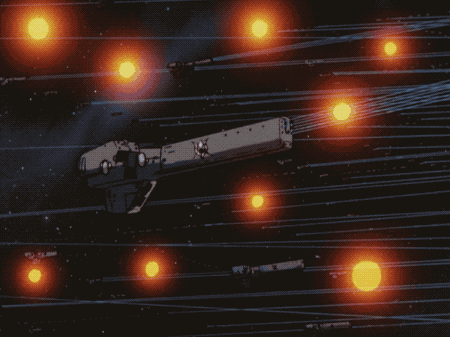
797/488. Reinhard sends Mittermeyer to kick the asses of some extremely whiny nobles, which he does with aplomb. Later, Reinhard sends Mittermeyer and Reuental together to... well, to attempt to kick the ass of Ovlesser, a significantly more threatening noble. Tensions mount among Braunschweig’s team, particularly between Merkatz and everyone else (save Schneider, of course). Reuental and Mittermeyer succeed at capturing Ovlesser, after much frustration and at great cost. Despite everyone else’s desire for revenge, the sinister Oberstein convinces Reinhard (and Reuental and Mittermeyer) to let Ovlesser go; as Oberstein predicts, Ovlesser’s comrades-in-nobility interpret his return as meaning that he betrayed them in some way, and he is unceremoniously executed as a traitor. Chalk up another win for Oberstein’s fucked up plans! Meanwhile, Mittermeyer makes moon-eyes at Reuental, and Ferner enjoys carrying out Oberstein’s plans a little too much imo.
Reuental and Mittermeyer

Reinhard and Kircheis are great and everything, but Reuental and Mittermeyer are the greatest love story of all time. I’m not biased.
(From “My Conquest.”)
I promised early on that eventually, Reuental and Mittermeyer’s relationship would stand alongside Reinhard and Kircheis’s as one of LoGH’s two epic love stories. Sadly, Reuental and Mittermeyer have had very little screentime up to this point, so I haven’t had much reason to talk about them for longer than to remind you that yes, they did go on a date this episode, thank you very much. Until now! Finally, in episode 20, Reuental and Mittermeyer take center stage, which makes now the perfect time to dig into their presence on the show so far.
Synchronization
When it comes to battle, Reuental and Mittermeyer are a well-oiled machine. We’ve seen them consult with each other before and after fleet battles; we’ve also seen them work together fluidly in hand-to-hand combat, without the need to consult at all:

In episode 11, Reuental and Mittermeyer invite themselves to help Kircheis rescue Annerose and, upon encountering a bunch of Benemunde’s cronies, take the lead in taking them down. Notice how Mittermeyer and Reuental claim their respective quarries by assigning them to each other, rather than to themselves, underscoring their affinity.
Above, Reuental and Mittermeyer communicate in a kind of shorthand: Rather than speaking directly about their plan, they talk around it, with the implicit assumptions not only that it’s already been decided save the details, but also that they both know what it is. And unlike the dynamic between Reinhard and Kircheis, who also have their own non-verbal methods of communication, neither Reuental nor Mittermeyer is subservient to the other: Both have an equal say and exercise their right to express that without hesitation.

Sorry Kircheis, this may be your fight, but it’s way more important for the audience to understand that Reuental and Mittermeyer are equals than it is for you to get to sit in the front seat. Maybe next time!
(From episode 11.)
We see this dynamic play out again in episode 20, when Reinhard sends Reuental and Mittermeyer to take down the bloodthirsty High Admiral Ovlesser. When the original plan to overwhelm him with battle-axe-armed infantry fails miserably (and violently, so, so violently), Reuental and Mittermeyer decide to go in themselves as bait—which all seems perfectly normal until you realize that they never actually discussed this plan out loud.

Just like the show’s audience, the aide standing literally right next to Reuental and Mittermeyer had no idea what their plan was until they both started talking about it simultaneously. In both a subtler and a more literal interpretation of Reinhard’s “Kircheis is the same as myself,” Reuental and Mittermeyer nonchalantly operate as if they share the same actual brain.
When they do eventually succeed at trapping Ovlesser, the battle-harmony between Reuental and Mittermeyer is even further emphasized, this time with some clever camerawork:

Mittermeyer kicks away Ovlesser’s axe, at which point the camera is behind his legs; then he turns around and... wait, it’s Reuental?! How did they do that?
Mittermeyer and Reuental have been acting as one all this time, but here the camera goes a step further and treats them like one physical body. Even when Reuental and Mittermeyer aren’t occupying space together on the screen, LoGH’s creators want to make sure we interpret them as two halves of a whole. This is a lot more than just a throwaway cinematic trick.
Body Language
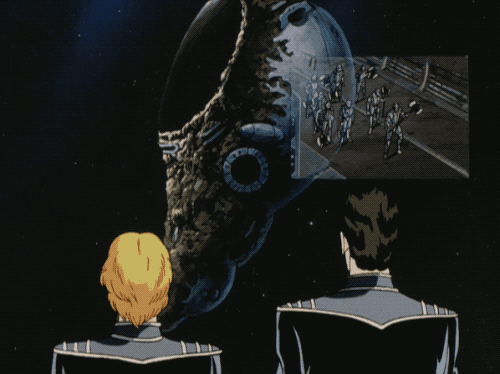
In the absence of expository flashbacks, the characterization of Reuental and Mittermeyer’s relationship is conveyed to us mainly via their (present-day) physicality. And the way they move when they’re onscreen together is unique to them, a visual representation of a type of intimacy we don’t see with the relationships between any other characters.
The gif above, in which Reuental and Mittermeyer sigh in unison, is a straightforward but striking example of how precisely their movements are choreographed to match one another. Mittermeyer leans his head slightly forward; Reuental leans his slightly back; the amount of negative space between them stays exactly the same the whole time, just shaped a little differently. Without mimicking each other’s positions, Reuental and Mittermeyer manage to give the impression of perfect balance. It’s a kind of approximate visual symmetry that’s both very expressive and very satisfying to watch—and we’ve been watching it, in fact, since “My Conquest.”

Like with their sighs above, here Reuental and Mittermeyer move in tandem—but instead of keeping the negative space between them the same, they move into it equally, so it becomes smaller but stays symmetrical. Also: Note the complementary head-tilts.
(From “My Conquest.”)

In many of these scenes, the camera itself remains static, allowing Reuental and Mittermeyer to be the only movement in the frame so the viewer can focus on how they fill a space together. In this moment from episode 5, the completely symmetrical background contrasts with how Reuental and Mittermeyer both reach subtly into the other’s “half” of the screen before settling against the balcony.
Not even the fact that Mittermeyer is several inches shorter than Reuental can get in the way of their visual balance—above, for example, Mittermeyer walks slightly ahead of Reuental, so his time in the center of the screen is longer. Below, Mittermeyer brims with energy and dynamism while Reuental is still as a statue until he expresses his restrained but emphatic agreement:

Mittermeyer’s physically asserted rage allows him to take up more space than his smaller stature would allow on its own, while Reuental, like Kircheis (usually), reins himself in. Taken together, they again balance each other out.
This isn’t the first time we’ve seen a couple’s dynamic encapsulated in how they move to fill the screen. In fact, the contrast with Reinhard and Kircheis’s framing helps reveal how carefully the animators worked to portray Reuental and Mittermeyer as equals:

The great thing about this moment from episode 4 is how strikingly out of balance Reinhard and Kircheis are while still using the same visual language of approximate symmetry that is used for Reuental and Mittermeyer. Kircheis literally struggles to catch up and be close to Reinhard, crawling back into the screen when Reinhard drags himself away—there’s symmetry here, but not equality.
When you combine all these elements—the give-and-take, the use of negative space, the slightly uneven but somehow perfectly balanced movement—you end up with scenes like the one below, in which Reuental and Mittermeyer discuss their aforementioned (and silently agreed upon) plan to ensnare Ovlesser. It’s a scene that is so casually well-choreographed that it is truly a wonder to behold:
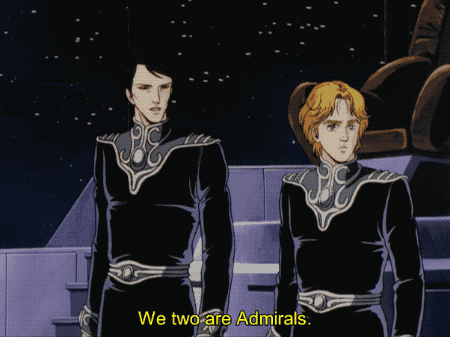
Looking at this gif fills me with a quasi-religious ecstasy. It’s perfect.
Above, Mittermeyer, who waits a beat before responding to Reuental’s movements, shifts his stance into the negative space that Reuental has just vacated, which keeps their bodies aligned. Mittermeyer puts his hands on his hips (a favorite position for him), and Reuental follows by putting his behind his back, so the space their bodies occupy is symmetrical but their postures are not. Mittermeyer waits for Reuental to put his openly gesturing hand away before putting both of his up; and through it all Mittermeyer is affectionately watching Reuental’s face while he describes their plan to someone offscreen.
At this point in LoGH, we still know next to nothing about who these two ridiculously handsome and distinguished admirals are. But if we pay attention to how their bodies interact on screen, we can begin to piece together who they are to each other. With Reuental and Mittermeyer, that’s a really good place to start.

Then again, sometimes you don’t have to pay attention beyond the embarrassingly fond expressions these two wear whenever they look at each other. Seriously this moment makes me blush.
(From “My Conquest.”)
Ugh, More Character Redraws
I regret to inform you, dear readers, that the fiends behind LoGH’s cursed “remastered” character redraws are back at it again, and this time, it’s personal:

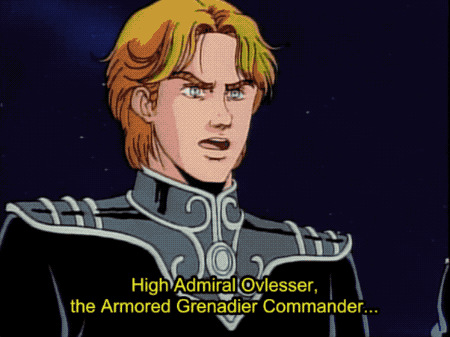
Of all the characters who suffer from redraws—and nobody is safe, NOBODY—Reuental truly has it the worst, because the changes made to his expressions venture into character assassination territory. Above, you can see a perfect example of how Reuental’s demeanor was completely altered (on left) from how he was originally animated in the LaserDisc version (right). On the LD, Reuental learns who is guarding the passage he is to infiltrate with Mittermeyer, and he is visibly concerned. In the remasters, his apprehensive frown is flipped into a smile that says: “I’m not the kind of person who would worry about all the troops under my command who are probably about to get killed!”
This is far from the last time we’ll see Reuental’s character hardened like this, and I promise I will point out EVERY SINGLE INSTANCE, because Reuental was originally drawn to be a lot warmer, gentler, and more human than the redraws would have you believe. It should go without saying that this is a pretty significant change, and one that has the potential to affect one’s interpretation of Reuental (and of Mittermeyer) a great deal—it should also go without saying that when there are big differences like the one above, I’ll be analyzing (and embedding gifs of) the original LD versions.
Stray Tidbits
I'm honestly so impressed with the visual shorthand for "awful" that the animation team uses to describe the Imperial nobles. It basically comes down to nothing more than their hair and facial expressions, but the overall impression is that they sure are a bunch of fancy little boys.

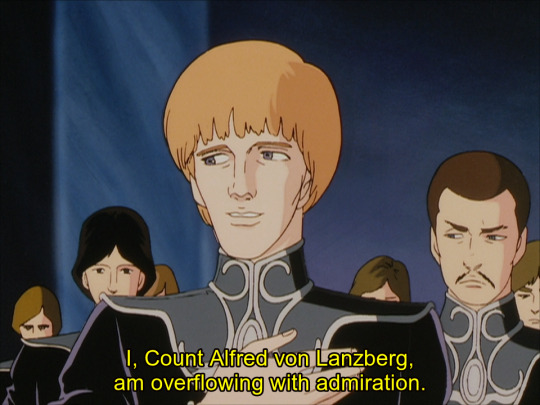
My first impulse is that Ferner needs to calm the fuck down for two seconds, but on the other hand, I guess I’m glad he has an acceptable outlet for his weird urges?

Besides war, drinking, and going on dates with Reuental (which usually involve drinking), Mittermeyer’s favorite hobby is roasting Bayerlein. Seriously every time Bayerlein tries to get in Mittermeyer’s good graces in some way, Mittermeyer shuts him down spectacularly. It’s incredible. I don’t know what Mittermeyer’s problem is but I’m not complaining, I mean look at that side-eye/eyeroll hybrid!

Mittermeyer is so good at war that he gave this guy an ulcer that almost killed him. Sure, I buy it.
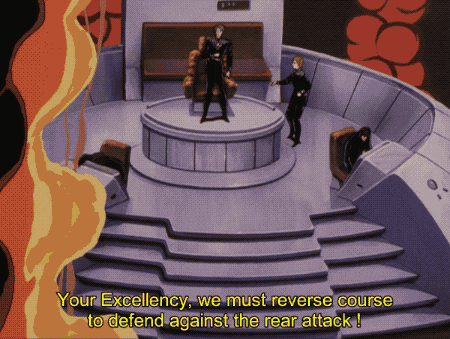
I’ve gotten a lot of mileage out of this gif, so now I offer it to you, humble reader. Go forth and use it well.

#Legend of Galactic Heroes#Legend of the Galactic Heroes#author: Elizabeth#Reuental#Mittermeyer#Empire#body language#redraws#Reuental deserves better#Oskar Meyer#that's the proper R/M pairing name#long-suffering Bayerlein
26 notes
·
View notes
Text
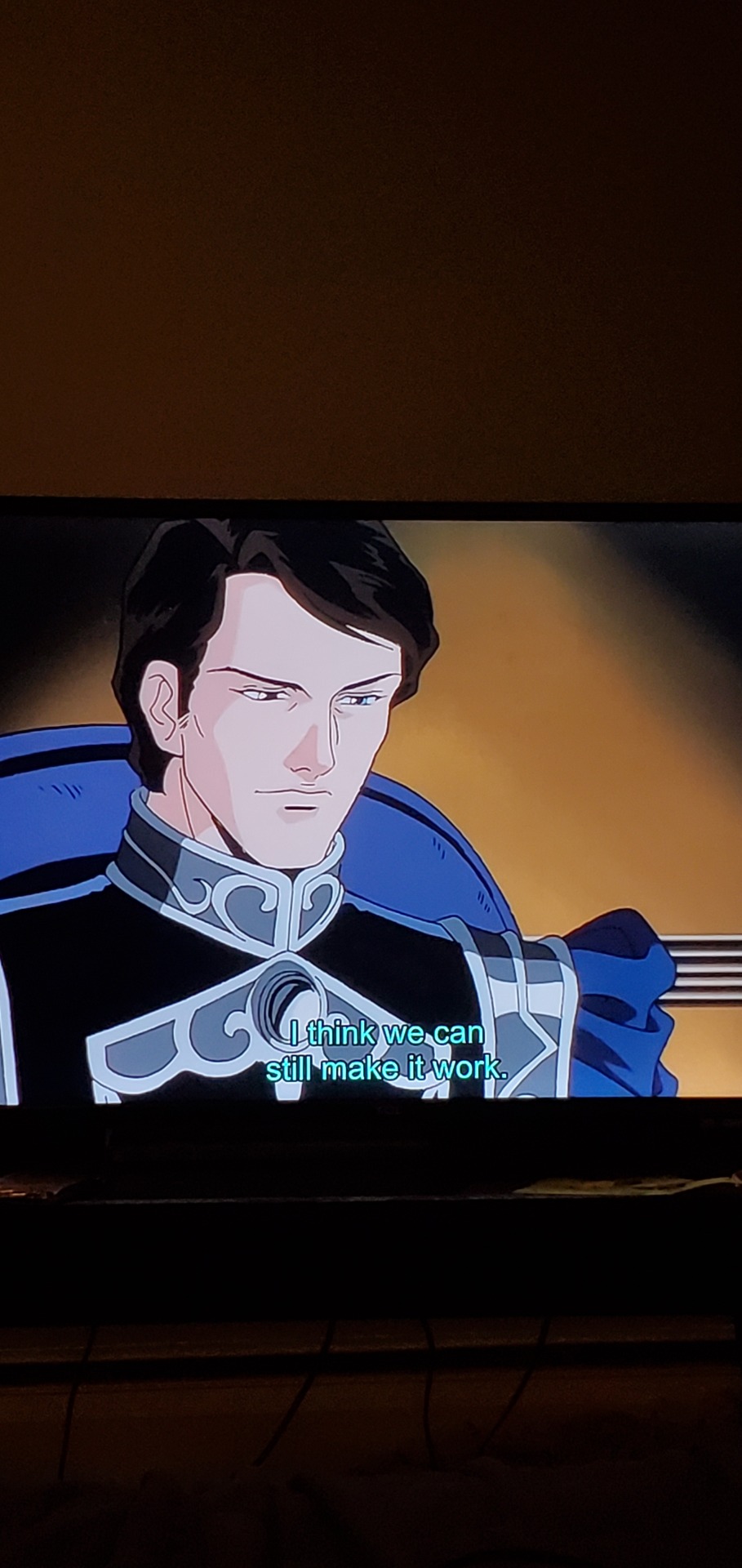
Mittermeyer trying to get reuental to go to couples therapy
5 notes
·
View notes
Text
marxism-leninism-utenaism replied to your post:
okay no, i’m convinced, mittermeyer and reuental...
what convinced you
this right here: https://logh-icebergs.tumblr.com/post/168757512827/episode-28-portraits
once they laid out the case i was struck by its complete and utter irrefutability.
5 notes
·
View notes
Photo



ロイミタx ポプテピピック Reuental/Mittermeyer x Pop epic team
118 notes
·
View notes
Text
Commentary regarding Icebergs (1 to 4)
· Ice: The Free Planets Alliance idiotically splits their 40,000 ships into three fleets far apart from each other
· C’mon, it was a nice idea, the execution was the problem here. That, and the commanders’ pride
· -
· Ice: Meanwhile, Reinhard and Kircheis make moon-eyes at each other
· We all have to admit that, when we start this, there’s a lot gazing into each other’s eyes that makes you a bit suspicious
· -
· Ice: Reuental and Mittermeyer go on a date
· YOU GUYS KNOW I ACTUALLY SUSPECTED THEM OF BEING A COUPLE
· -
· Ice: Kircheis gently nudging Reinhard to be a bit more empathetic than comes naturally to him.
· I agree with this
· -
· Ice: Annerose is a tragic figure, and on the surface she’s characterized as a pretty one-dimensional martyr-type, which can be frustrating and confusing in a show where even the most minor character contains multitudes. But Annerose does contain multitudes—they’re just hidden under a series of facades, erected by a woman who has been subjected to a decade of sexual slavery
· I hate to say it, but this is true
· Still don’t like her though
· -
· Ice: and by a creative team that was trying, in 1988, to tell a story about two boys falling in love.
· Ok, I wasn’t expecting them to jump right into it, but let’s go
· Maybe they’ll convince me
· -
· Ice: She is beautiful, docile, and a victim, the quintessential damsel in perpetual distress. She feels like a symbol, in a world richly populated by humans; her identity is presented to us as revolving entirely around men. There’s no way around it: As our first named female character, Annerose is irritating as hell
· I ain’t gonna disagree with this
· -
· Ice: the fact that in the LoGH novels and short stories, Annerose is heavily implied to be Kircheis’s love interest, whereas in the anime, Kircheis’s love interest is Reinhard. There are a few ways we know for sure that this was an intentional divergence, which we’ll definitely bring up when we get to them
· I’m curious, cus the show did sell me the whole romantic subplot between Sieg and Anne
· -
· Ice: Yang takes command of the remaining fleet after his commander is injured, and promptly outsmarts Reinhard when Reinhard tries to split his fleet down the middle by…splitting the fleet down the middle himself. This forces the battle to become a clear metaphor for the endless futility of this 150-year-war
· THAT’S VERY TRUE, NICE
· -
· Ice: Yang’s history and relationship with Jessica will get fleshed out more in the future
· Guys
· No, guys
· Jessica was awesome
· She was an amazing female character
· I’m still very sad that she had to die so soon
· And without accomplishing much (or having much airtime)
· -
· Ice: But also 2) train yourself now to peel away any heteronormativity that’s coloring your assumptions about what the show wants you to think.
· Ice, I think you’re starting to push it…
· -
· Ice: Who is this mysterious and beautiful baroness attempting the sisyphean task of cheering up Annerose? Why, it’s Magdalena von Westfalen
· I LIKED HER AND THEN SHE DISAPPEARED FROM THE PLOT, WHAT HAPPENED
· -
· Ice: Magdalena takes absolutely no shit from anyone, and I (Elizabeth) would die for her.
· Same
· -
· Ice: Who the fuck is this person? Yang has a “ward”? Why? IS YANG BATMAN?? These are all good questions to be asking yourself.
· Yang trying to be Batman would be hilarious
· Cus I just see him complaining every step of the way
· -
· Ice: Character development in small visual details: Julian styling his collar and sleeves to exactly match Yang here shows his hero worship and desire to emulate him.
· OOOOOOOOOOOOOOOOOOOOOOOOOOOOOOOOOOOOOOOOOOOOOOOOOOHHHHHHHHHHHHHHHHHHHHHHHHHHHHHHHHHHHHHHHHHHHHHHH
· -
· Ice: White men: eating this nationalist crap up. White women: feeling slightly uncomfortable but not saying anything. POC: so over Trunicht’s bullshit that they literally all faked sick to avoid him.
· Ok, no, I’m loving this
· -
· Ice: By now I’m sure you’ve noticed that the power structures in LoGH are incredibly male-dominated. (…) Hell, LoGH doesn’t indisputably pass the Bechdel test until episode 103 out of 110.
· Story of my life…
· -
· Ice: The handful of female characters that we do get to know exist within this society as fully defined individuals
· Ok, this I don’t completely agree with
· The author tries to give some sort of dimension to the female characters he creates, but they all end up… limited. And not in the way that represents “Oh, society doesn’t let women do what they want”, but simply in the way that women… are still women. And this is extremely hard for me to explain.
· I’m conscious that all the women in the show are women. And you probably are going “Yeah, and what’s the problem with that?” but that’s the thing. Like being blond or black or needing to wear glasses, it should just be a characteristic and not something that defines them (even if society then stereotypes you and forces you into going through certain events that become common for said characteristic – however, said experience is always personal). A female character in LoGH is female first and then something else.
· That isn’t to say that what the author did with his female cast isn’t great, because it is. He cared enough to portray their struggles, even if he didn’t identify with them (and because of it, they feel somewhat generic), and I’m pretty sure that the years the novels and the animated show came out in weren’t as kind to female characters as he was. However, by our current standards, it’s very lacking.
· I’m not sure I managed to express myself well, but I’m moving on.
· -
· Ice: Meanwhile Julian, a 14-year-old boy, happily and enthusiastically keeps house for Yang, cooking and cleaning and making tea. While many of the female characters overtly break with the traditional roles assigned to women (by entering politics, the military, etc.), Julian is one of the only characters to push in the other direction; and it’s important that (spoiler) the show never plays this for laughs or really remarks on it at all
· Huh, this is true
· Very true
· And I never realized that
· Nice one, show!
· -
· Ice: And again we see his passivity as he lets the silence stretch until she finally walks away.
· Kinda of one of the reason why Yang sometimes pissed me off
· -
· Ice: Kircheis is rudely accosted by the sinister Oberstein.
· Not a fan of Oberstein, I see
· Well, I was informed of it, so I was expecting it
· -
· Ice: Oberstein absolutely uses his malfunctioning robot eyes to intimidate people and then pretends he was unaware.
· I like this idea, but at the same time I really think he’s just like thatTM
· -
· Ice: But first, Oberstein. We’ve seen glimpses of him in the background before now, but it’s finally (deep sigh) time to meet everyone’s least favorite character. You probably don’t hate him yet, but you will. Oh, you will!
· HA!
· -
· Ice: Kircheis, a very smart boy, hates Oberstein pretty much the second they meet.
· I actually disagree
· I think Sieg was wary of Oberstein
· But to be honest, I never thought Sieg hated him
· In fact, I think Sieg would one of the few that would almost like Oberstein
· -
· Ice: we’ll have plenty of time to hate Oberstein later on
· COME AT ME
· -
· Ice: Almost as soon as Reinhard (jumping out of the car like a little kid, bless his heart)
· God bless his heart, indeed
· -
· Ice: Reinhard seems to interpret his father’s meaning to be that Annerose consented, or at least assented. Horrified, he sprints upstairs and demands to know why she would do such a thing. Her answer, adding yet another layer of Fucked to this already Extremely Fucked situation, is basically, “I’m doing it for you.”
· Ice: No pressure, Reinhard!
· *aggressively points to this*
· -
· Ice: Kircheis, with no direct way to help, does the only thing he can: He follows Reinhard on a dangerous, er, mission in the hope that he can maybe keep things from escalating too much. Which… is pretty much Kircheis’s job in life, to be fair.
· God bless that boy, he tries so much
· -
· Ice: Reinhard has never, not once in his life, chilled.
· THAT’S WHY WE LOVE HIM
· -
· Ice: This is a huge turning point for Reinhard, who finally has somewhere to aim his ambition: He’s going to do whatever it takes to get Annerose back, and if that means rearranging the entire universe to suit his needs, that’s what he’ll do.
· Like the way Ice expresses this. Rein has an enormous amount of ambition, but said ambition had yet to take a shape. This sentence implies that Rein could have used it in other areas, but it was this event with his sister that ultimately guided him unto a specific path. I like that idea a lot.
· -
· Ice: Kircheis isn’t going with Reinhard because Annerose wants him to; he isn’t even going with Reinhard because Reinhard wants him to: Kircheis is going with Reinhard because he wants to.
· THIS
· -
· Ice: I assume Reinhard looks so relieved here because he somehow managed to walk successfully down a flight of stairs backwards.
· I THOUGHT THE SAME THING
· -
· So far, I’m enjoying Icebergs
· I think the homosexual subtext they’re trying to read into is kinda forced, but nothing too grating so far
· -
5 notes
·
View notes
Text
LOGH Episode 11
Episode 11: The Actress Exits
This episode is set in the Empire.
The post may contain my personal opinion / commentary.
Locations:
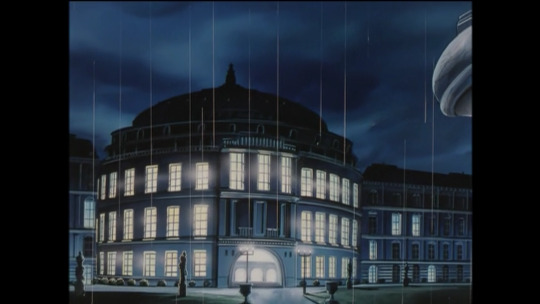
Imperial Theatre
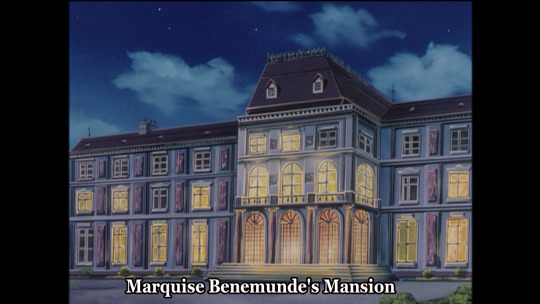
Marquise Benemunde's Mansion
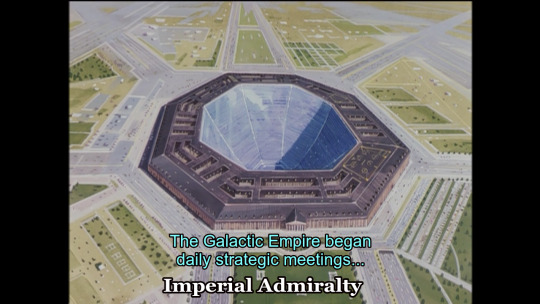
Imperial Admiralty
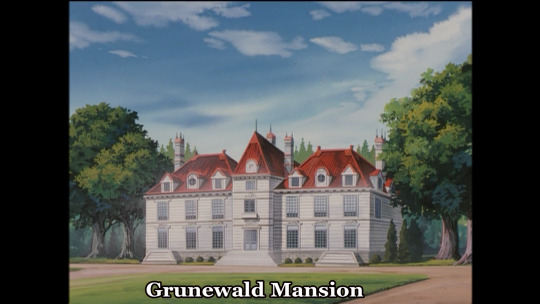
Grunewald Mansion
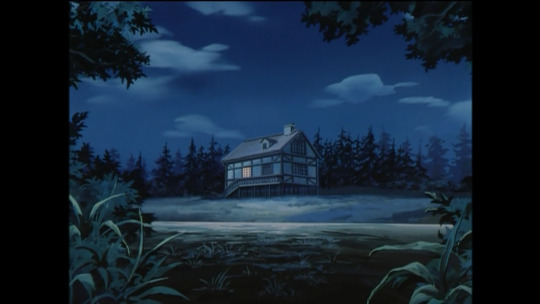
Little cottage
Characters:
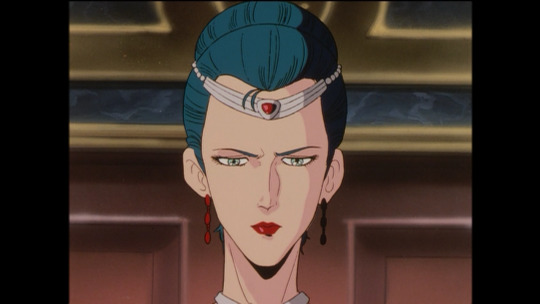
Marquise Susanna Benemunde
Misc:
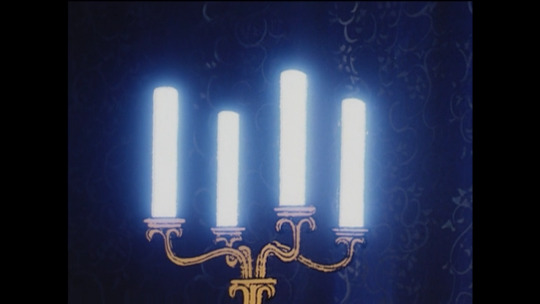
Glowing candle thingies (they look cool)
Narration:
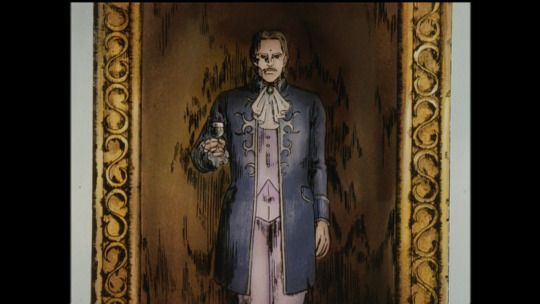
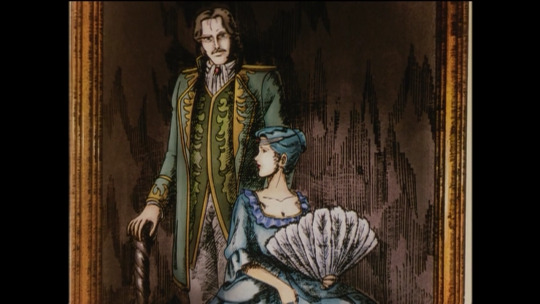
Friedrich IV succeeded to the throne at age 29. When he reached his mid-fourties, Friedrich IV sought beautiful companionship. For a time, Marquise Benemunde monopolized his favors. But that, too, did not last for long.
One day, on a street corner, an Imperial staff member saw Annerose von Musel, a 15 year old girl.
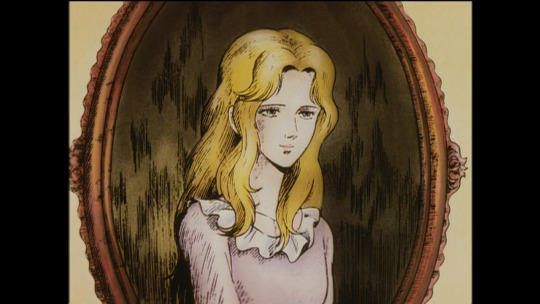
Annerose was summoned to court to accept Friedrich IV's attentions. (Yuck! I mean I knew that she was around that age but... she’s just a child. It's horrible.) She was given the title of Countess Grunewald. Annerose accepted her fate. That was 10 years ago.
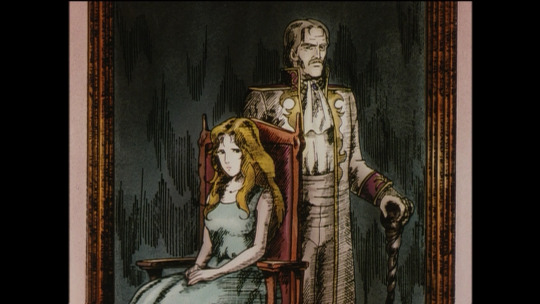
The story:
Friedrich IV and Annerose leave from a musical theatre performance. The marquise tries to speak to Friedrich but he turns away without answering her. The marquise blames Annerose as the reason for Friedrich not coming back to her.
Baron Flegel and the marquise discuss Annerose, Flegel tells her that the nobles think she is the reason of Friedrich's depression and "casting a shadow of ill omen" over the Goldenbaum Dynasty, and she should be ostracized from court along with her brother. Basically Flegel instigates her to bring Annerose to disgrace.
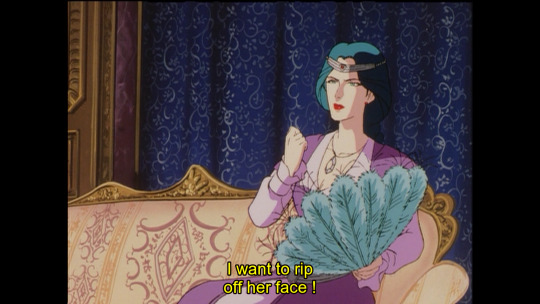
(Whoah there, lady!)
Flegel later talks to one of his allies and says that all suspicion should fall to Benemunde if something goes wrong. And also kill her so she doesn't speak of it.
Kircheis goes really philosophical!
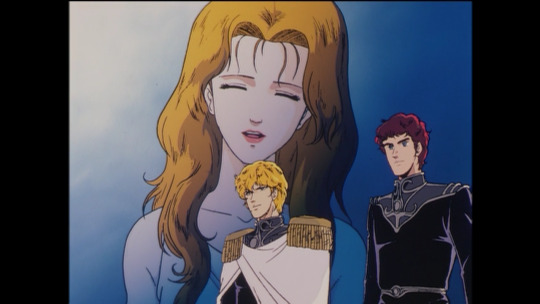
R: I had a dream last night. A dream when we were children. When the three of us, you, me, and my sister, were together.
K: Sometimes I wonder which is reality... then or now?
R: Then or now?
K: Yes. Maybe now is just a dream. Am I wandering in a long gallery of dreams? There are times when I think so. (No wonder, Kircheis, you have a loooot of flashbacks.) One day the dream fades, and I return to another day. When you and I were children, and Lady Annerose was still with us. And then I'd say to Lady Annerose. "I had a dream. Lord Reinhard and I became soldiers, important men, commanding warships and going to the ends of the universe."
R: Which reminds me of why I called you. (Wow, what a buzzkill, Reinhard! Kircheis was having a moment!) This was delivered today.
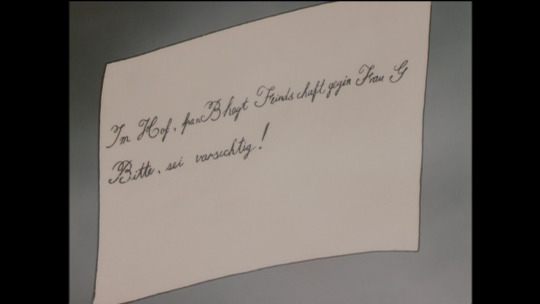
K: "Miss B plans to kill Miss G of the Court. Please be careful."
R: "Miss G"... Countess Grunewald, my sister. And "Miss B"?
K: Probably Marquise Benemunde.
R: I think so, too. In that case, there's no reason to stand idle. I'll have Oberstein investigate immediately.K: When someone is promoted to a position of power, how many others lose their positions? At Court, there's plenty of hatred, envy, and jealousy. All kinds of bad feelings grow. There are many who envy you and Lady Annerose. I think many plots may be brewing.
R: Yes.
K: A warning note like this is evidence your enemies have enemies. The most frightening thing is that those opposing plotters decided to join forces.
R: The Court is a spider's web. Plots ad traps are woven over and over again. That place isn't worthy of my sister.
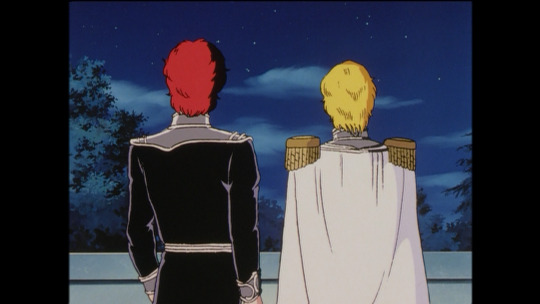
Narration:
The Galactic Empire began daily strategic meetings on the recapture of Iserlohn Fortress. Reinhard, as an Imperial Admiral, was required to attend these meetings. Meanwhile, rumors that Marquise Benemunde was planning to murder Annerose, were spreading wildly through the Imperial Court.
Benemunde gets sent away on Friedrich IV's wishes to her country manor.
Annerose gets a message about Reinhard getting badly wounded. She gets going immediately. Reuental and Mittermeyer notice her leaving from a car. They go search for Reinhard.

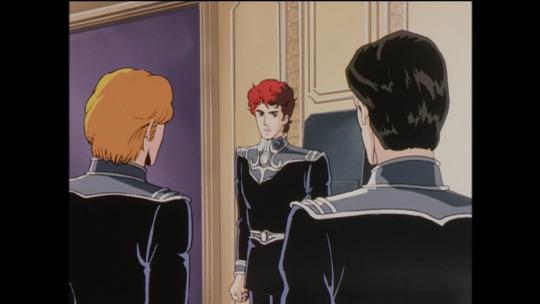
As he is in a meeting, they tell Kircheis who decides to deal with the situation without bothering Reinhard (after failing to contact Reinhard because bureaucracy). Reuental and Mittermeyer convinces him to let them help (they can identify the car, and they need to repay the trust Reinhard gave them).
Annerose's car gets ambushed and the perpetrators bring her to Benemunde in a small cottage. Benemunde insults her for a while. After that, she pours wine into a glass and pours some drug into it as well (which was hidden in her ring). She's planning to make it seem Annerose slept with someone and committed adultery against the Kaiser.
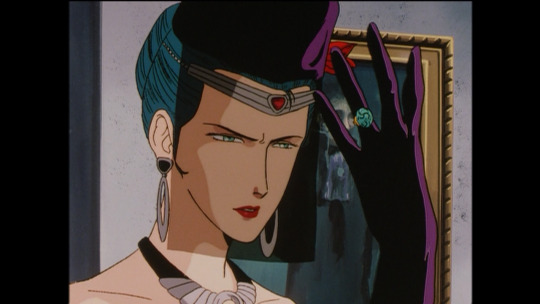
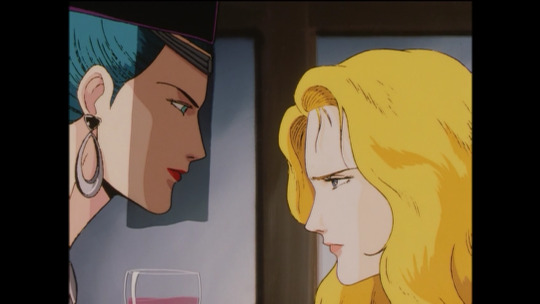

Kircheis, Reuental and Mittermeyer arrive at the place and two thugs start shooting at them. The trio overpowers them and gets into the house.
Benemunde holds a knife to Annerose's throat, and two thugs point guns at them, so only by the lights suddenly turning off can the trio overpower them. Benemunde escapes, Annerose didn't get any injuries. Oberstein appears, he was the one who turned the lights off.
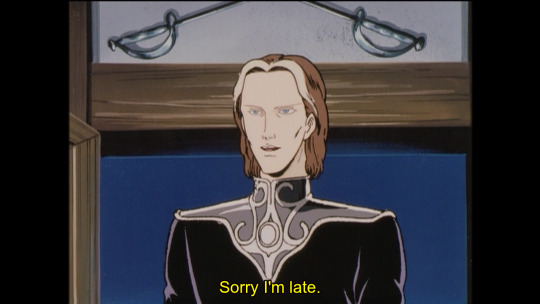
Kircheis and the other three explains the assassination attempt to Reinhard after the meeting is over. Kircheis tells Reinhard they don't know the identities of the men, but Oberstein did some research and he found that Baron Flegel is behind them, although he has no proof. But I guess Reinhard believes him either way.
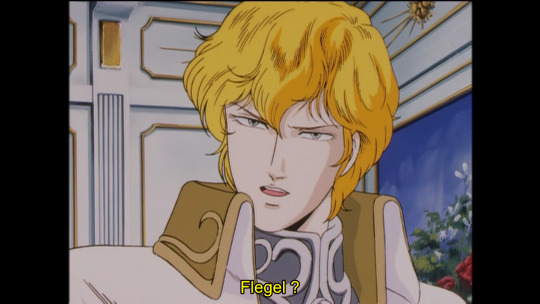
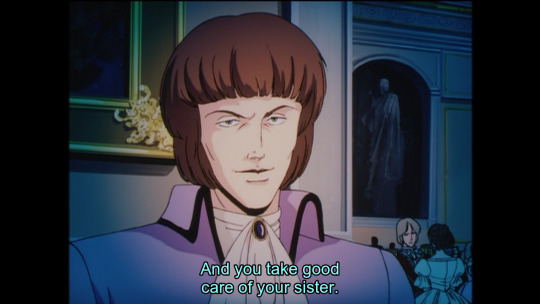
Flegel tries to ensure that his connection to the assassination attempt stays secret.
I guess Lichtenlade is also Imperial Prime Minister? Well, here's the Kaiser's arbitration: "For the crime of kidnapping and attempted assassination of Countess Grunewald, he sentences Marquise Benemunde to death. Because of his exceptional affection for her, she will be permitted suicide. Furthermore, because he still views the Marquise with courtesy, His Majesty will attend to her funeral.”
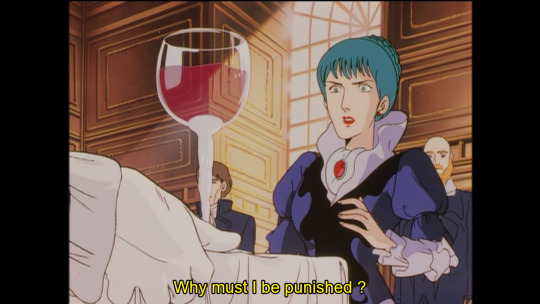
Um... because you tried to kill someone.
She spits on Reinhard then she is forced to drink the poison, and dies.
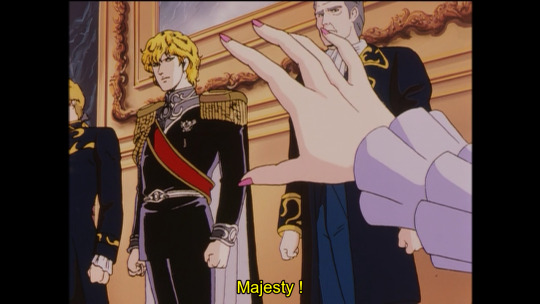
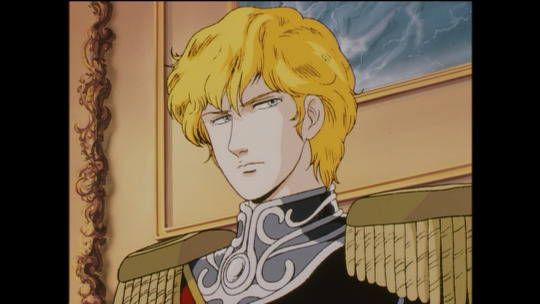
...Interesting choice of shot setting. She’s saying Your Majesty, and Friedrich IV is not in the room.
Reinhard meets Flegel on a corridor.
"Don't think you'll get away with it next time."
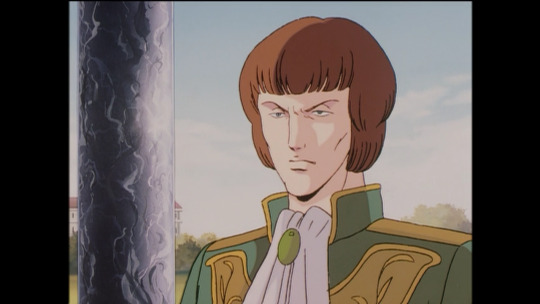
Reinhard and Annerose's conversation:
R: The Marquise Benemunde committed suicide.
A: Reinhard, please try to forgive her.
R: That woman? She tried to kill you.
A: Everyone, no matter who, feels sorrow, feels pain. Please try to understand her feelings. She once stood high on a pedestal. Now she's forgotten, and shut out of his heart. She must have felt a terrible grief.
R: Sister...
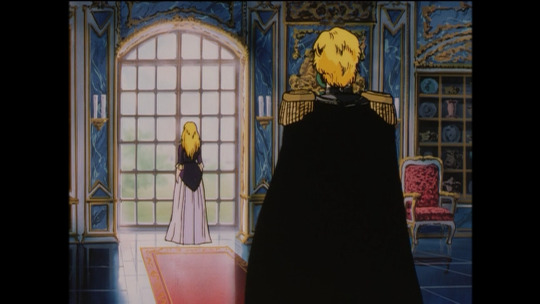
Interesting choice again, Annerose in the light, Reinhard in the shadows in his black cape.
I’m kind of having a feel of Reinhard being in a morally grey area, and that he would be a great villain actually. Maybe he will be. Kircheis and Annerose are very powerful sources of keeping him in line, and on the right path. Annerose does a great job in trying to improve Reinhard's emphatic skills. Annerose is a great character, and I love how they deepen our knowledge of her. I appreciate that Reinhard does not dismiss her comments, but actually seems to think about them. He seems to respect her a lot, and value her intelligence. I hope we'll see the results of this in the future.
I also like the choice of Reinhard wearing white or black clothing alternatively whether it's actually depending on his mood or not.
Narration:
The Galactic Empire's Goldenbaum Dynasty has begun to decline. The rot of decadence penetrates deeply into it's society. And incidents like this are the result. It was usual that such things be dealt with in secrecy within the Imperial Court. On the same day, Marquise Benemunde's death from a sudden illness was announced.
BONUS ROUND: Annerose is absolutely beautiful
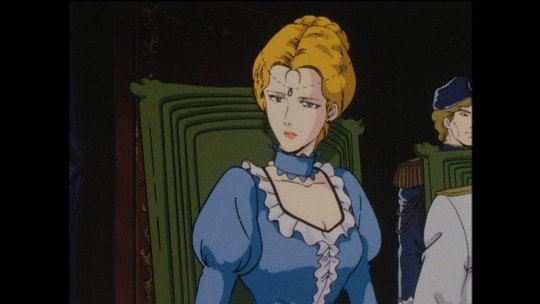

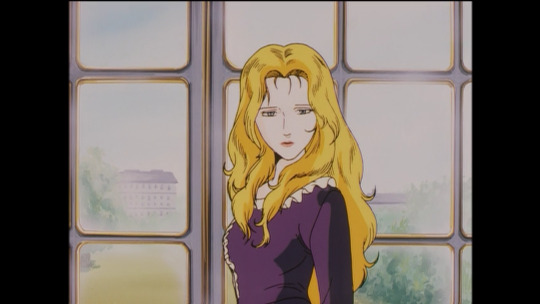
Episode 12: Advance Toward Imperial Territory
#logh#logh episode 11#legend of galactic heroes#legend of galactic heroes episode 11#logh episodes#my post
3 notes
·
View notes
Text
Posting here from me to me I guess...
Still, at least all of my Oskar/Wolf stuff is in one place where I can quickly find it, even if it's just screaming into the void again...
#oskar von reuental#wolfgang mittermeyer#ginga eiyuu densetsu#die neue these#logh#legend of the galactic heroes#reuenmeyer#Roimita#OskarWolf
0 notes
Text
Episode 0: My Conquest Is the Sea of Stars

Welcome to the inaugural post of Icebergs, the English-speaking internet’s best website devoted to queer close-readings of every episode of the space opera/epic romance/anime masterpiece known as Legend of Galactic Heroes! Thank you for embarking on this journey with us, and we hope you’ll take a few minutes to skim our FAQs page before settling in for this (absurdly long) post. In the FAQs you’ll find a comprehensive description of wtf we’re trying to do here, as well as wtf LoGH even is and how you can watch it. We do recommend watching episodes before reading our posts, so if you haven’t seen “My Conquest” yet, probably go do that now. We’ll wait.
Okay, if you’re ready, let’s do this!
We begin with “My Conquest Is the Sea of Stars,” something of an hour-long pilot episode for Legend of Galactic Heroes. Okay, I know anime series don’t usually have pilots, and I guess that isn’t technically what “My Conquest” is, but if you’ve ever watched a very pilot-y pilot before (Buffy’s comes to mind), you’ll know why I’m calling it that. Like a pilot episode, “My Conquest” has some consistency issues with the rest of the show—ranging from very minor to things you’ll have to pretend never happened if you want to remain in your right mind—but establishes many of the themes, relationships, and dynamics that make up the backbone of the main series. So, for this first post, rather than analyzing the movie with the same fine-toothed comb we’ll be using for OVA episodes 1-110, we’re going to use the themes, characters, and relationships introduced in “My Conquest” as a jumping off point to do a general introduction to LoGH as a whole.
History
“If one were to say that the history of mankind is the history of war, few would disagree.”
This proclamation by the narrator is a grim and rather grandiose way for the whole thing to begin (while German script scrolls by in the background behind crumbling busts of statues...really I think the whole show reaches its peak of pretension in the first five seconds or so of this movie). But this speech does in fact set up a deeply important framework: this is a history. We are here to explore these events, these people situated in a broad historical context of endlessly repeated warfare. Who are the people who will actually influence the course of this history? What societal forces shape them? These themes—the rise and fall of powers, the inevitability of conflict, even some pretty meta questions of what it means to study and record history—are all woven throughout the show.
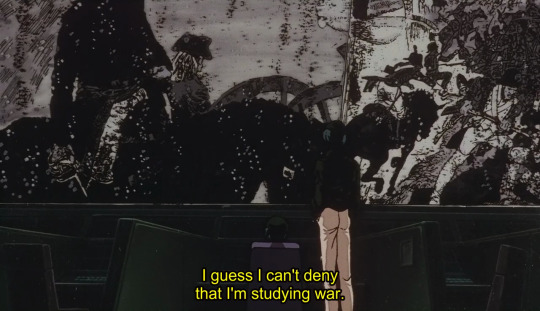
It seems that in 1600 years how people study history is...by sitting in a room with giant movie screens watching a sequence of rapidly-changing grainy images? No wonder they are doomed to repeat it.
In practice this historical perspective means that LoGH is not a show driven by shocking plot twists that come out of nowhere, nor is it focused on impressing you with the cleverness of futuristic sci-fi marvels. Which is my roundabout way of saying, yes, listen, Reinhard’s gimmick with the fusion bomb in the Battle of Legnica may or may not make any sense. Reinhard’s brilliant tactic of passing completely exposed in front of the Alliance fleet in the Fourth Battle of Tiamat may feel a bit silly. That’s not why we’re watching these battles. These are the people who will shape the history of this galaxy, and in these two battles we begin to explore what drives them, who they are, how they think.
War
Legend of the Galactic Heroes is an anti-war epic.
That’s clearly an overly-simplified statement, but I want to start there because I strongly believe it to be true and Important. This is not an idealistic, naive pacifism: We are watching a history of an ongoing war, situated within a framework established by both the narrator and by Yang of viewing human history as cycles of inevitable warfare. The main characters, characters we believe in, not only participate in war but create and perpetuate it. Yes, war is sometimes noble. Yes, war is sometimes practical and unavoidable.
But this is an anti-war epic, and we see the seeds of that scattered all throughout “My Conquest.” The war between the Galactic Empire and the Free Planets Alliance has been going on for 150 years by now, and over and over we’re reminded that the actual reasons for fighting are mainly lost to the people involved in the battles. The Imperial high admirals are using these battles as tools in their own political court dramas: trying to eliminate a potential political threat in Reinhard, while manipulating for more political power themselves when they return home from the front lines. Yang’s commander also seems to lack any perspective larger than wanting to score a minor victory for himself.
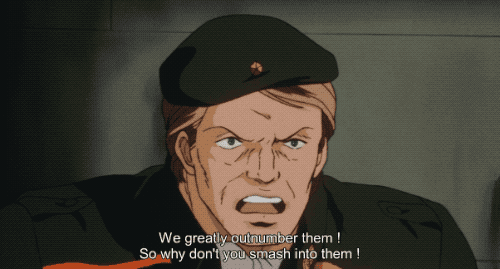
A lot is packed into those lines. At this point in this endless war, what would motivate individual soldiers to suicide themselves just to play a numbers game to win a minor skirmish that won’t ultimately tip the war in any direction? What would motivate individual soldiers to give up their own lives for the glory of their commanding officer?
If there’s a single Main Theme of “My Conquest” as a standalone movie this is it: The war is fought by individual people with agency, identities, agendas, and loyalties that often don’t align with what’s dictated by idealism/patriotism/duty/etc. We see the Alliance fighter pilots placing bets against their own side, on the calculation that if they lose and most of them are killed, the ones left standing will get a bigger share of the pot. Wandering the strip on Iserlohn before the Fourth Battle of Tiamat two unnamed gunmen in Reinhard’s fleet discuss the upcoming battle:
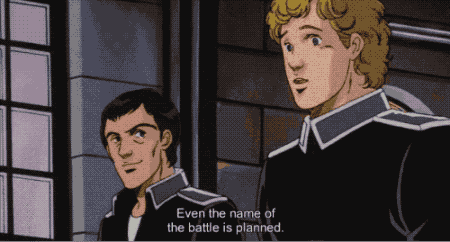

The Alliance pilots deal with this existential uncertainty by betting frivolously on their own comrades’ deaths; the Imperial gunmen deal with it by spending the night drinking at a brothel. Meanwhile Yang agonizes over whether he could save lives if only he put himself in a position of more power, and Reinhard and Kircheis carefully cultivate the personal loyalty of the individual soldiers in their fleet (see: Kircheis telling two soldiers who get into a brawl defending Reinhard that Reinhard knows their names better than the names of other admirals). In their own ways, Reinhard and Yang are both set apart from their commanding officers by their ability to see the soldiers as individuals and to see through the pointless ritual of the current battles. “My Conquest” establishes that we’re viewing war at all levels of zoom: from the court dramas of the high nobles of the Empire to the people who actually shoot the guns and fly the planes.
Reinhard and Kircheis
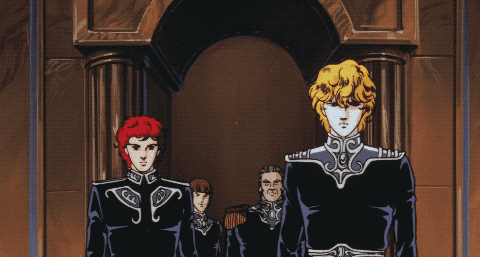
The relationship between war-prodigy Reinhard von Musel (later Lohengramm) and his loyal companion Siegfried Kircheis is central to the whole series, and one that we’ll be examining at great length and in excruciating detail. They’re a lot of what LoGH is “about,” and when we talk about queerness and heteronormativity in LoGH, we’re probably talking about Reinhard and Kircheis about 35% of the time, which is a lot considering how many queer characters and non-normative relationships are packed into this show.
Reinhard and Kircheis are in love; their relationship is one of the two Great Romances in LoGH. This will become increasingly clear as we get further into the main series, but even as early as “My Conquest” it’s demonstrated that the two are at the very least an insular pair—other characters understand that there are things Reinhard shares only with Kircheis, and we frequently see them communicate without speaking. LoGH’s beautiful art style, which is apparently an acquired taste (I guess some people have bad taste, too bad for them!), allows for an absurd level of detail in facial expressions, and the animators really make use of every single line and frame of animation. “My Conquest” establishes some of the visual vocabulary LoGH uses to describe/indicate romantic relationships in general, and Reinhard and Kircheis’s in particular, much of which happens directly on their faces.
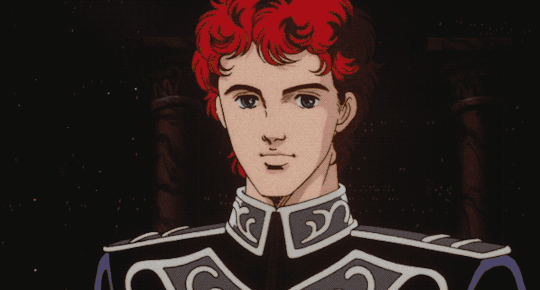
LoGH loves using every means at its disposal to convey information to the viewer, so pointed (coquettish?) looks like these are just as important as what characters say—if not more.
Of the two of them, Reinhard is flashier (we are frequently, FREQUENTLY reminded that he is literally the most beautiful person in the universe) and more ambitious than his counterpart, but Kircheis is either just or quite nearly as brilliant as Reinhard. Always a few steps above Kircheis in rank, Reinhard asks him for gut checks on his more controversial decisions, and it quickly becomes pretty obvious that Kircheis’s is the only opinion Reinhard trusts implicitly. There will be a lot more to say about them soon, but for now, just know that you're not imagining it: There's something going on between these two.
Queerness (in more general terms)
On that note, and given that almost all of the interactions between Reinhard and Kircheis (and many other pairs of characters) can be interpreted in at least two ways—one of which passes as heteronormative, and (at least) one of which decidedly does not—it would probably be helpful to talk about how we’ll be talking about queerness in LoGH.
A high percentage of queer content in today’s media is still conveyed via subtext, so it’s unsurprising that ~30 years ago (in Japan, but we’re not scholars of Japanese queer history, and god knows the west is also fucking terrible on this front), queer narratives could only exist behind a veneer of heteronormativity. LoGH’s veneer (or “surface reading” as we will probably call it more often) is mercifully thin, and only gets moreso over the course of the OVA, at which point Gaiden proceeds to smash it to bits.
But it is there! Nobody in Legend of Galactic Heroes is running around in a rainbow-striped pride jumpsuit shouting about how they are living their gay truth. (As we discuss at length in our FAQs, and will not discuss again after this post, if you need to hear the words “I’m Gay” uttered onscreen in order to believe that they’re true, turn back now!) The most striking and consistent example of this is the use of the word “friend” to describe people who are clearly romantic partners. This is a tried and true technique of fooling the straights into believing a thing is as heteronormative as they want it to be; therefore, we will be ignoring it in favor of analyzing what we see going on in front of our eyes.
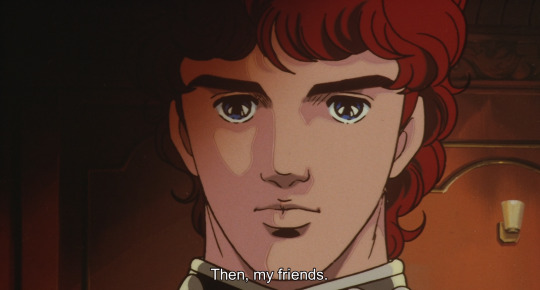
When Reinhard refers to his "friends" as one of his concerns (the Japanese actually has no indication that this is plural, fwiw), the camera lingers on Kircheis, telling us in no uncertain terms what the actual topic of conversation is.
What is interesting about the heteronormativity-compliant “surface readings” of LoGH, though, is that the societies depicted in LoGH are just as heteronormative as those of the real world. This is barely even hinted at in “My Conquest,” but when we get to it, you’ll see a cool thing happen: Both LoGH’s creators and the characters they create use the same tools to navigate their respective heteronormative, homophobic societies, impatiently pushing past those who would stand in their way. Just as it is expedient for Reinhard to refer to Kircheis as his “friend” as they rise through the Empire’s ranks together, so the show’s creators refer to Kircheis as Reinhard’s “friend” so that they can tell the queer story they want to tell without worrying about barriers. LoGH is layered as hell, and it totally rules.
Reuental and Mittermeyer
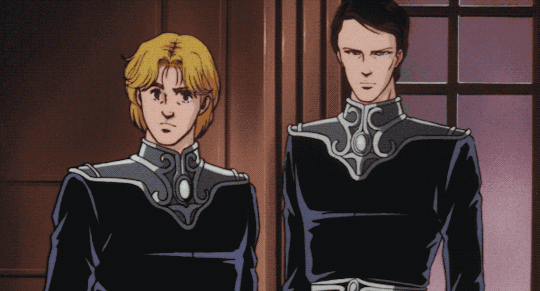
LoGH’s other Great Romance won’t be fleshed out for awhile, because that’s how long it takes for Reuental and Mittermeyer’s relationship to be relevant as anything other than background color. But even before it becomes central to the plot, you can keep an eye out for all the ways it’s suggested that these two have a relationship that’s not dissimilar from the one between Reinhard and Kircheis.
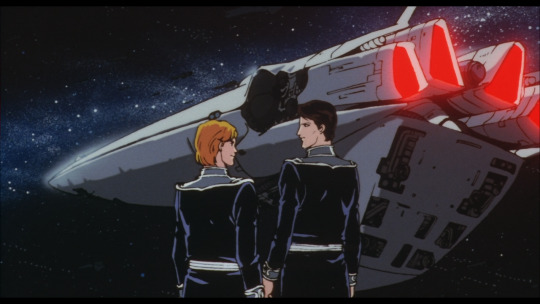
Like with Reinhard and Kircheis, the camera does a lot of the descriptive work for Reuental and Mittermeyer, like in this shot seemingly optimized to make it look like they're holding hands.
When they do eventually move into the foreground, Reuental and Mittermeyer are positioned as a counterpoint/foil to Reinhard and Kircheis, so taking note of all the times LoGH quietly but firmly tells us they’re a couple early on is both fun and helpful for understanding much of what happens later. You’ll be able to recognize these telling moments by the fact that it’s literally every time Reuental and Mittermeyer are both on your screen. It’s actually pretty unsubtle.
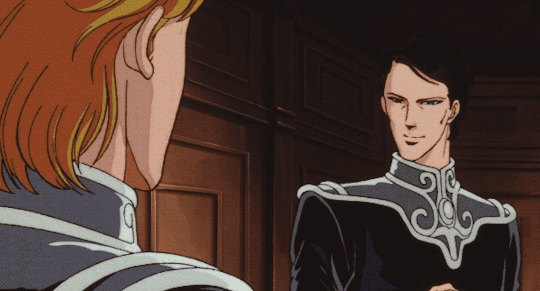
Yang
Ah, Yang Wenli, resident historian, political philosopher, and often moral center of the show. “My Conquest” quickly introduces us to several of Yang’s most salient features: he hates coffee (preferring tea, brandy, or ideally a mix of both), he seems to dislike chairs (preferring to hop up onto a table), he yearns to spend his time studying history, and while he feels rude not answering all the love letters he gets, he laments the cost of stamps and paper. (Keep this last one in mind—it is a nontrivial piece of the Yang Wenli puzzle, and actually a brilliant little bit of character building.)

It was with this shot that I personally (Rebecca) fell in love with both Yang and this show.
It also introduces us to one of his central conflicts: the tension between his natural laziness and lack of personal ambition on one hand, and his understanding that he has insight that many of the commanders above him lack that could potentially save lives or even help move the war toward a conclusion on the other. We see this in his guilt over not pushing harder for the Alliance fleet to ascend out of the trap Reinhard set for them on Legnica in the first half of the movie, and again as he sadly confesses to his friend Dusty that he’s been thinking for some time about how to end this war. From the beginning Yang’s character seems to be one of paradoxes: fighting a war despite believing it to be foolish; propelled to some kind of renown by the mysterious events at El Facil (that still cause him to receive a whole desk full of fanmail eight years later) despite his natural reticence; struggling with a feeling of obligation to shape the future when what he’s always been interested in is studying the past.
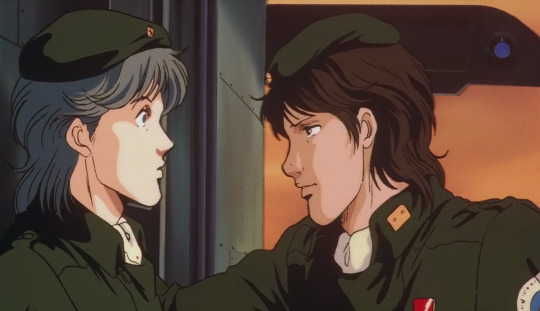
Another Yang paradox: being accidentally incredibly sexy while also completely oblivious about it… poor Dusty!
Worldbuilding
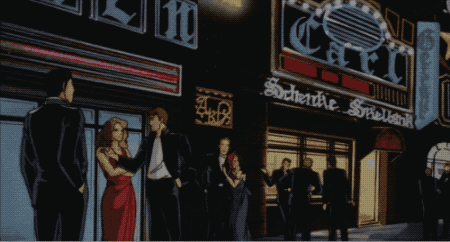
Because of its disproportionate focus on personal relationships and relatively lo-fi (for space, anyway) battles, it’s easy to forget that Legend of Galactic Heroes is science fiction—hard science fiction, in fact, meaning it’s plausible and well-researched, with no fantasy elements whatsoever. The world of LoGH is revealed to us slowly, almost exclusively via small matter-of-fact glimpses (I’ve always thought of it as “tip-of-the-iceberg storytelling,” no relation to this blog’s title!). Even the narrator’s pervasive presence is an integrated part of LoGH’s world: By the end of the OVA series, it’ll be pretty obvious whose voices have been merged, via future space academia, to form the narrator’s.
Right from the beginning, LoGH trusts its audience to put together scattershot pieces of information—the screens used for planning and fighting battles; Iserlohn’s thriving bar culture; holographic (pornographic?) magazines—into an increasingly coherent whole. This isn't often particularly important, thematically speaking, but the world's three-dimensionality adds yet another layer of realism to LoGH's already superbly-developed cast of characters. Also, the Future Technology has aged absurdly well, which is just really fucking cool.
Stray Tidbits

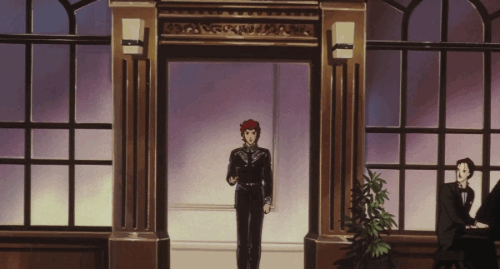
Captured above: one of the most badass moments in the entire show.
Wtf holographic porn magazine are those random soldiers reading…?
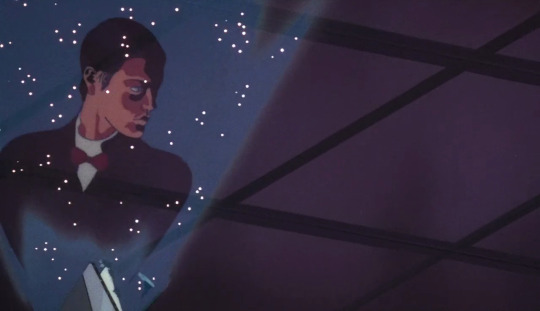
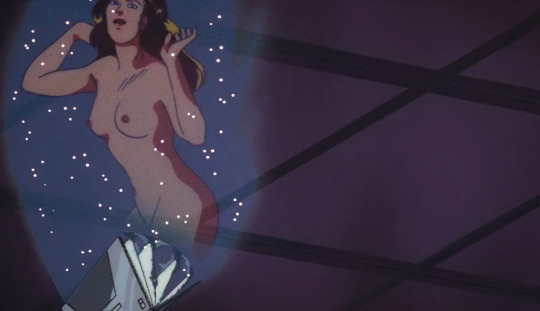
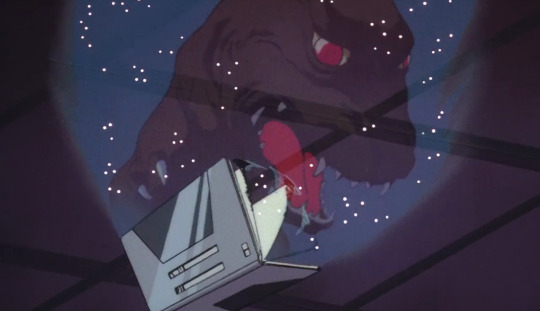
OOC alert: y’know when Reinhard is like “my life isn’t worth us losing this [basically meaningless] battle! Fire!” and then the actual captain of the Brunhilde stops him? Yeah as far as we can tell that is 100% not something Reinhard would do. Please ignore it. Reinhard has goals he would never abandon that easily.
OOC alert, Yang edition: We’ve never been able to figure out why Yang gives the fighter pilots a 500 dinar note. Yes, the point comes across that instead of giving them the reprimand they expect he plays along with their betting game, which is in character, but throwing money around in an ostentatious way isn’t. Anyway, there won't be another OOC alert until after we finish the OVA, so you can relax. We know you were worried.
And speaking of that betting scene, pay attention to the goofy redhead and the blonde; they’ll be back and they’re awesome.
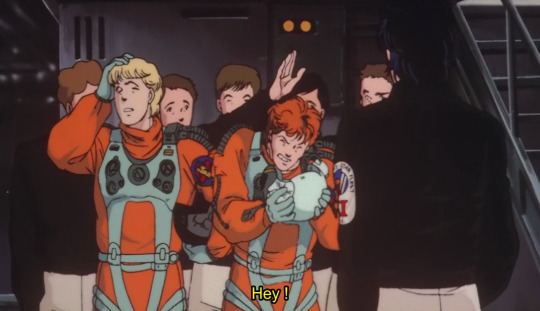
#Legend of Galactic Heroes#Legend of the Galactic Heroes#My Conquest Is the Sea of Stars#author: co-authored#author: Rebecca#author: Elizabeth#Reinhard#Kircheis#Yang#Reuental#Mittermeyer#war#history#queerness#worldbuilding
23 notes
·
View notes
Text
I'm watching the mittermeyer/reuental fight and I have no clue what the FUCK is going on but wahlen is an absolute lad
1 note
·
View note
Text
okay no, i’m convinced, mittermeyer and reuental are gay
3 notes
·
View notes
Text
Episode 30: Lost Things

March 18, 798/489. In the Empire, Reinhard’s fleet prepares to warp Geiersburg Fortress into the Iserlohn Corridor. On Iserlohn, Yang prepares to submit to a dubiously lawful inquiry by the hostile—but democratically elected!—Alliance government. Hilda convinces Mecklinger to pay a visit to her sick cousin, who teaches us all about the importance of having hobbies. And Geiersburg’s test warp, thanks to Kempf and Mueller’s adept leadership, goes off without a hitch. Meanwhile, Reinhard sinks deeper into depression, Julian blows off steam at the shooting range, and Reuental and Mittermeyer (you guessed it!) go on a date.
Reinhard Alone

Reinhard may be dead inside, but he still looks amazing. Episode 30, in particular, has some of my favorite animation in the series, so please enjoy all the ridiculously beautiful heartbreak as much as you possibly can through your tears.
We haven’t spent much time with Reinhard since the traumatic season 1 finale, so we’re long overdue for a check in with our fast-rising Empire-side hero. How’s he been doing?

Not great!
(From episode 28.)
Once you're immersed in how LoGH tells stories, it’s tempting to say that Reinhard’s newly sour affect “should come as no surprise,” given what he’s been through. And though that is true on an in-universe level—nobody who suffered the tragic loss of a long-time romantic partner only months ago should be expected to have recovered already—it would be disingenuous of me to suggest that surprise at the way LoGH treats Reinhard’s grief is unwarranted.
In my episode 26 post, I talked about how my past experiences as a queer consumer of media had primed me for LoGH to handle Kircheis’s death poorly, and what a surprise it was when my expectations were subverted. In that light, Reinhard’s grief—the way it changes him, the way it has a tangible presence, the way other characters tiptoe around and discuss it—is a surprise. It’s a constant reminder not just of how important Kircheis was (and still is) to Reinhard, but also of how committed LoGH is to treating its queer characters and their relationships with respect.
LoGH can be a difficult show to watch. Not only does it have over a hundred incredibly dense episodes to get through—some of which are basically impossible to parse unless you watch them more than once—but it’s also deeply, sometimes overwhelmingly sad. Depending on the context, though, that can be good, or at least validating. And Reinhard’s grief, upsetting though it may be, is fundamentally important to a queer reading of LoGH.
Like I said during episode 26, Kircheis’s death is a turning point for the slow dissolution of LoGH’s heteronormative surface reading. And the unflinching portrayal of Reinhard’s grief from here on out is evidence of an ongoing decision on the part of LoGH’s creative team to allow what was formerly confined to subtext to remain above the surface.
The Locket

The way Reinhard’s voice softens when he talks to “Kircheis” via his locket is dramatic and says a lot more on its own than is possible to express in a mere text caption. If you missed it the first time, definitely go rewatch this scene in episode 28 (the timestamp is 3:45) to get the full effect.
The most obvious manifestation of Reinhard’s grief is, of course, his locket, in which he keeps a family photo and a lock of Kircheis’s hair. Some of Reinhard’s colleagues, as I’ll get to in a minute, worry about him because of how much he’s changed since Kircheis’s death. But I would argue that a lot of what’s so disturbing about Reinhard’s transition into Life Without Kircheis is the lack of change, at least in one respect: He still relies on Kircheis for emotional support, as is evident in the gifs above, and for strategic advice, which we see a bit of in episode 30 (below), and will see more of in the future.

Hilda is particularly attuned to Reinhard’s new habit of playing with his locket whenever—were Kircheis still alive—he might have looked to him for input, approval, pushback, or whatever.
There’s nothing inherently unusual about accessing one’s memories of a departed loved one for guidance, but Kircheis was Reinhard’s only intimate relationship before he died, and now that he’s gone, Reinhard still shows no interest whatsoever in diversifying his support network. As a result, his only intimate relationship is now with an inanimate object—or, to put it another way, he has nobody.
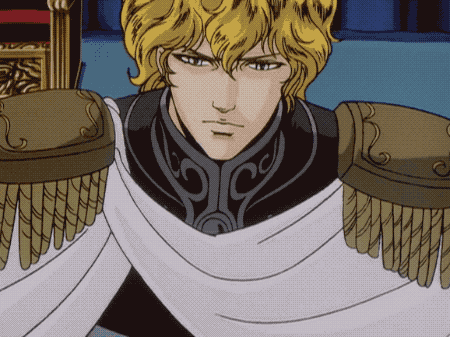
Of course, Reinhard’s isolation isn’t entirely self-imposed. Annerose was also a source of strength and comfort before she voluntarily withdrew from his life. If things had gone differently and Annerose had stayed, Reinhard might not feel so lonely—but would that have been healthier, for either of them? I’m not sure. My guess is: not significantly.
Other People
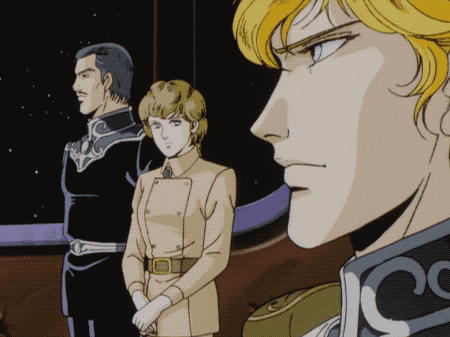
I’m not sure Reinhard realizes how obvious it is to everyone around him the extent to which he’s been utterly destroyed by Kircheis’s death. The fact that he wouldn’t care even if he did realize is, well, not unrelated.
From the relatively trivial to the life-altering, rumors and hearsay play a substantial role in our understanding of LoGH’s world and characters. Reuental and Mittermeyer, who have already spent a good deal of time gossiping about Reinhard and will continue to do so far into the future, are responsible for a good portion of the Empire-side gossip that we see—probably as a factor of their daily standing date. In episode 30, Reinhard’s two highest ranking admirals discuss the depths of his grief in vague terms:

It’s worth mentioning (as always) that Reuental and Mittermeyer’s bodies during this scene are beautifully aligned, without being symmetrical. The line of Mittermeyer’s torso is precisely parallel with Reuental’s left arm! Look at it! In case you hadn’t noticed, I am in awe of the animation team’s treatment of these two.
Reuental and Mittermeyer’s discussion of Reinhard and Kircheis is, of course, about more than just Reinhard and Kircheis—this is Reuental we’re talking about, after all, and he is pathologically incapable of saying one thing without also meaning at least five other things. For the time being, though, this scene mainly adds another, third-person dimension to Reinhard’s grief: We already know how it is affecting him personally; now we also know that it is affecting the people around him, that they’re aware of it, and that these are important enough facts to merit scenes of this length devoted to conveying them.
Hilda, on the other hand, is a lot less prone to gossip than Reuental and Mittermeyer—or maybe she just hasn’t found the right gossip partner?—so her feelings about Reinhard’s situation are communicated to us differently, mainly via looks (above) and internal monologue:
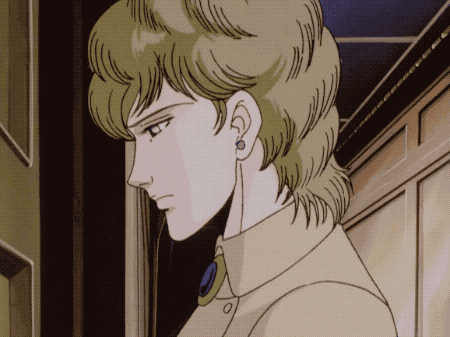
Worry not, dear reader: I’ll be spending tons more time on Hilda and her well-articulated emotional intelligence in the very near future. For now, feel free to repeat “Hilda knows everything” to yourself whenever you see her on your screen, because that basically sums it up.
I also love this little exchange, after Reinhard shuts himself away (again) in the room on Geiersburg where Kircheis died:
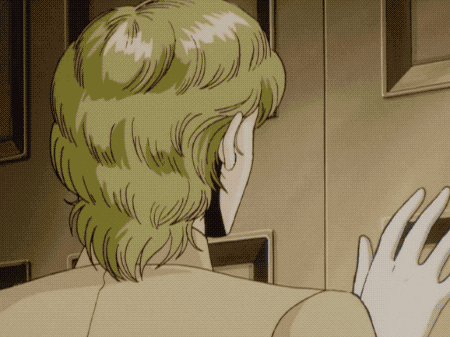
Kempf and Mueller’s quick look of mutual understanding here is so simple, but goes a long way towards expressing that the topic of Reinhard’s grief is never far from anyone’s lips among the admiralty.
These are all—even the lengthy conversation between Reuental and Mittermeyer—comparatively small moments in the overall landscape of LoGH. But taken together, they convey that Reinhard’s grief is not small; not for him, not for the people around him, and not for the galaxy.
Reinhard’s Oberstein Eyes
On a subtler character note, remember a few episodes back when Rebecca likened Reinhard’s eyes to Oberstein’s? Well, you may have thought she was being facetious, but she extremely was not. Allow me to demonstrate:

Here are Oberstein’s eyes as they appeared in episode 4. Their most noticeable trait is, obviously, the fact that they’re flashing red. But another distinctive characteristic of Oberstein’s eyes is that they don’t have any highlights or other details beyond the pupil and flat, uniformly blue iris.

In contrast, this eye-heavy moment from episode 28 is a good example of how eyes are typically animated throughout LoGH—with the remarkably consistent exception of Oberstein’s which are, of course, artificial. Mittermeyer and Reuental’s eyes here both have distinct highlights, and seem to move naturally.
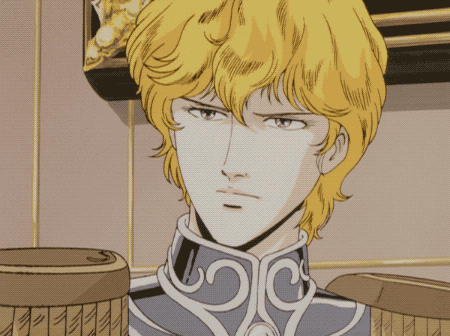
Here’s an example, from episode 9, of how Reinhard’s eyes in particular have been depicted before now: Note the visible highlights that change and move with his expression. Reinhard’s eyes do a lot of characterization work for him, and obviously got a corresponding amount of attention from the animation team.
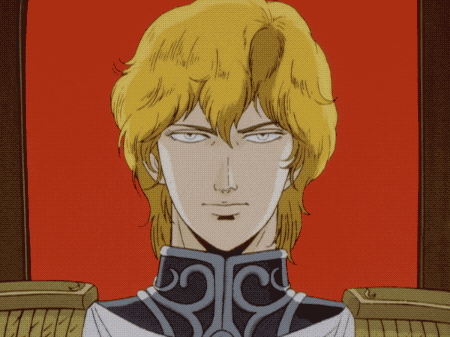
Compare that to Reinhard’s eyes here, in this moment from episode 27. Like Oberstein’s eyes, Reinhard’s irises are now flat and lifeless. They don’t move with the rest of his face and have none of the energy we’re used to seeing from him.

But unlike Oberstein’s, Reinhard’s eyes aren’t synthetic. So when he lets his guard down—which he can only do when he’s alone with his memories of Kircheis—we see unbridled pain and anguish flood back into them. Poor Reinhard.
Stray Tidbits
Can someone please explain to me exactly what is going on here? Why does Yang’s desk only go up to Schenkopp and Cazellnu’s knees? Why is Yang proportional to his weirdly tiny desk? Why is his entire head smaller than Schenkopp’s crotch? This single screenshot keeps me up at night with questions.
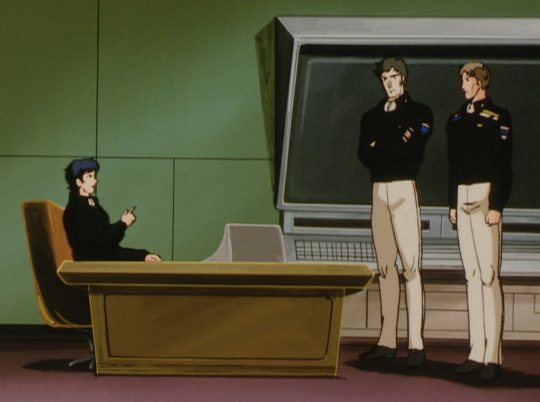
Maybe the furniture store that sold either Mittermeyer a tiny chair or Reuental a huge chair also has a location in the Alliance.
Try to imagine something more suspicious than not having a pet. How about liking books more than pets? Yeah, that’s what I thought.
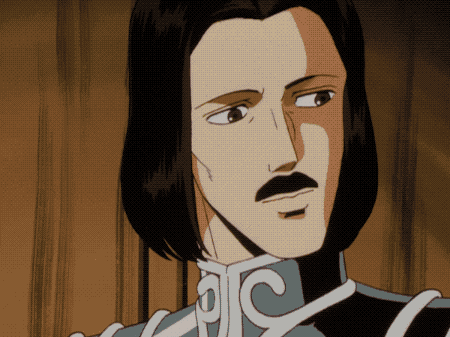

Time for some fun facts: Other than Da Vinci, the three historical figures that Hilda’s cousin mentions are Cao Cao, Lazare Carnot, and Tughril Beg. Biographical info on Cao Cao and Lazare Carnot makes it pretty clear they were both, like Mecklinger, Renaissance men who had a wide variety of cultural accomplishments in addition to their political/military careers; it’s harder to find information on Tughril Beg but my guess is that he falls into the same category.
#Legend of Galactic Heroes#Legend of the Galactic Heroes#author: Elizabeth#Empire#Reinhard#grief#queerness#eyes#Reinhard's locket#Geiersburg#gossip
21 notes
·
View notes
Text
Episode 23: The Fall of Goldenbaum

September 797/488. After a riot on Westerland leaves his nephew dead, Braunschweig decides to take the rather drastic measure of nuking the small planet’s entire population out of existence. This leads to the sinister Oberstein’s most sinister plan yet: Instead of stopping the Westerland attack, why not send a probe to record it and broadcast evidence of Braunschweig’s atrocities throughout the Empire? Reinhard’s tentative objections can’t stop Oberstein from lying to accomplish his goals, so the Westerland attack is carried out, the footage is broadcast, and Reinhard wins popular support and the civil war. Meanwhile: Ansbach, swearing revenge against Reinhard, forces Braunschweig to do the Honorable Thing and drink poison; Reinhard’s admirals save the Empire’s art collection; and Annerose gazes wistfully over a balcony.
Westerland

We’ve been given numerous warnings about Oberstein ever since he forcibly introduced himself to Kircheis back in episode 4, and guess what: In episode 23, shit finally hits the fan. No, Oberstein isn’t the one who planned and executed the attack on Westerland, but—well, actually, let’s go ahead and break down who exactly was responsible for what, because this will in fact be on the exam:
Person of Interest 1: Braunschweig

Braunschweig personally ordered a nuclear attack on Westerland, killing 2 million innocent people. He is obviously the worst and guiltiest party. Moving on.
Person of Interest 2: Oberstein

When Reinhard's instinct was, of course, to swoop in and save Westerland from Braunschweig’s attack, it was Oberstein who suggested allowing the attack to happen for Reinhard’s political gain. That’s fucked up, Oberstein!

Reinhard was rightfully scandalized at first, but he’s long been susceptible to Oberstein’s simple and effective brand of Machiavellianism, so he put off his decision until the last minute, which Oberstein told him was six hours away.

Oberstein then ordered Ferner to follow through with his plan despite Reinhard’s misgivings, in the process revealing to us that he had lied to Reinhard about how much time he had to make up his mind. Oberstein: He truly does suck.
Person of Interest 3: Reinhard

In a one-episode vacuum, Reinhard is almost blameless for the Westerland massacre: We don't know if he would have decided to side with Oberstein, or with his own conscience (and, presumably, Kircheis’s), had Oberstein decided not to be a duplicitous fuck. Outside the vacuum of this single episode, however, Reinhard is far more culpable. After all, he hired Oberstein, despite Kircheis’s warnings, under the naïve assumption that he could rein him in. More on this shortly.
Reinhard and Oberstein
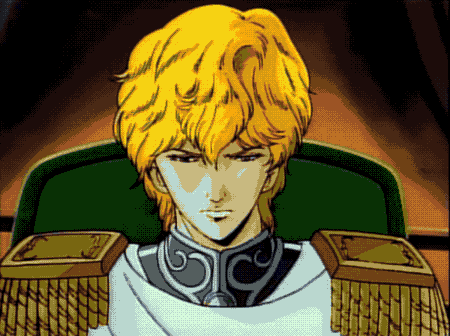
The word Reinhard uses here, 許す (yurusu), can mean either “forgive” or “permit,” so both the fansubs (left) and the official subs (“If you were here, you’d never, ever allow me to do this”) are valid interpretations, despite having different meanings.
Okay so are we all clear on who did what? Good. We’ll come back to that, but for now let’s fast forward a bit to the aftermath of the attack, at which point Reinhard, defying all earthly logic, finds out that Oberstein lied to him and decides not to punish him for it.
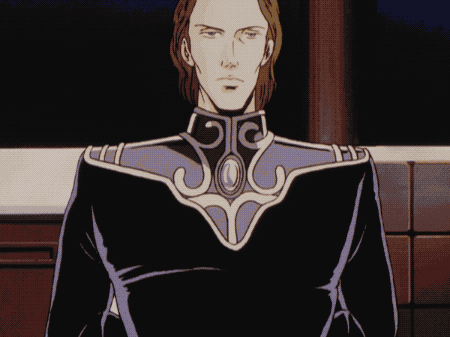
Maybe I’m just being optimistic, but it’s moments like these, in which Reinhard appears completely blindsided by the fact that Oberstein went behind his back, that make me think that if he hadn’t been lied to, Reinhard would have stopped the Westerland attack. Oh well.
The last time one of his subordinates flat out disobeyed him, Reinhard was so furious that Kircheis had to lecture him on the importance of leniency—and Bittenfeld’s transgressions were nowhere near as bad as Oberstein’s. So why does Reinhard not only refrain from taking action against Oberstein, but listen to his bullshit rationalizations after the fact?

Watch as Oberstein does a live performance of the dictionary definition of “refusing to take responsibility for your own damn actions, Oberstein.”
Since Reinhard hired (acquired? bought?) Oberstein, there have been very few times when they’ve disagreed enough for Reinhard to put his foot down. The only real exception has been the subject of Kircheis’s special privileges and “number two” status, on which Reinhard has (so far) been unwilling to budge.

Reinhard is far more uncomfortable with the fact that he is unable to convince Kircheis that Oberstein is an asset to their team than he is with Oberstein himself—to a point.
To be fair to Reinhard, Oberstein has, until now, refrained from recommending a course of action that was unequivocally evil—both to Reinhard’s mind and to Kircheis’s. His plans may have been morally ambiguous, but they were still at least on some level redeemable: Not only could Reinhard rationalize directing his subordinates to follow Oberstein’s recommendations, but Kircheis could rationalize turning a blind eye (sometimes literally) to Reinhard’s increasing reliance on such an openly morally grey character.
With Westerland, this changes. Oberstein’s suggestion that Reinhard allow the attack to take place is the first time we see Reinhard balk at a non-Kircheis-related proposal from his staff officer, and is therefore also our first chance to see if Reinhard really can, as he promised Kircheis back in episode 8, stand up to Oberstein. At first, it seems like he might:

Reinhard is obviously and viscerally repulsed by Oberstein’s cool utilitarianism here, and though Oberstein pushes him hard on it, Reinhard doesn’t back down from his insistence that he have time to decide on whether or not to exploit the attack for his own gain.
In the end, of course, we don’t get to find out for sure what Reinhard would have chosen to do, because Oberstein goes ahead without his knowledge. But Reinhard still has another shot to prove that Oberstein isn’t pulling his strings: Even if it’s too late to save Westerland, he could remove Oberstein from his position as Reinhard’s chief advisor (after Kircheis), thus preventing more Westerland-like fiascos in the future. But he doesn’t.
It makes sense that Reinhard would avoid the public, political spectacle that might result from court-martialing Oberstein; at worst, this could lead to popular opinion painting him as both complicit in the Westerland attack and incompetent. However, some form of discreet, private censure seems like it would be easy enough to do without attracting much attention. Unfortunately for Reinhard, there are other, less tangible obstacles standing in the way of not letting Oberstein walk all over him.
First of all, Oberstein is fucking terrifying. This isn’t as important a consideration as the next obstacle I’m going to talk about, but it’s worth mentioning that the man Reinhard would theoretically be up against just proved that he’s willing to allow an entire population of 2 million innocent people to be brutally murdered to achieve his goals.

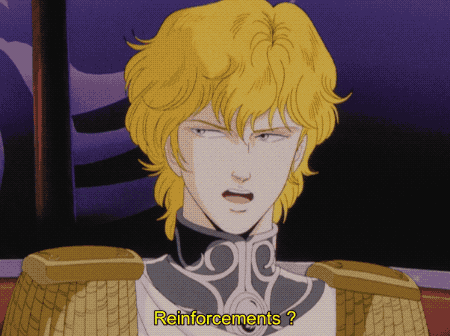
Until now, Reinhard’s commanding presence has been a dominant aspect of his characterization, especially when it comes to anything related to war: Above on the left (from episode 14), Reinhard leads his staff in a victory toast before he’s even won; while on the right (from episode 15), his harsh words for Bittenfeld’s actions cause a low-ranking officer to visibly cower. It’s not surprising that Reinhard, whose primary goal in life is literally to conquer the universe, projects confidence that often crosses the line into arrogance.
But this is in stark contrast to his subdued affect following the revelation that Oberstein went behind his back vis-à-vis Westerland:
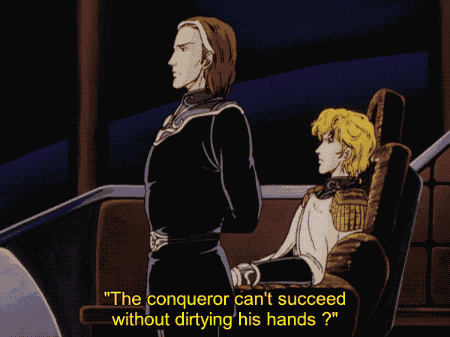
Reinhard seems trapped during this whole scene, unhappy and yet—for the first time that we’ve seen in a military setting—without the power to act. Unlike his usual fearless, imperious self, post-Westerland Reinhard has the disconcerting air of a cornered animal.
Of course, Reinhard’s fear is (or should be) moot, because he isn’t a cornered animal—he’s an Imperial marshal with a cadre of talented and loyal subordinates who would deal with The Oberstein Problem as soon as Reinhard said the word, if he ever did. Which brings me to Reinhard’s second and far more dangerous intangible obstacle: his pride.
From the moment that Kircheis first voiced his concerns about Oberstein, Reinhard has treated him like more than a mere staff officer; faced with the possibility that Oberstein might be too much for him to handle, Reinhard promptly turned him into a symbol of his belief that, in fact, nobody is too much for him:
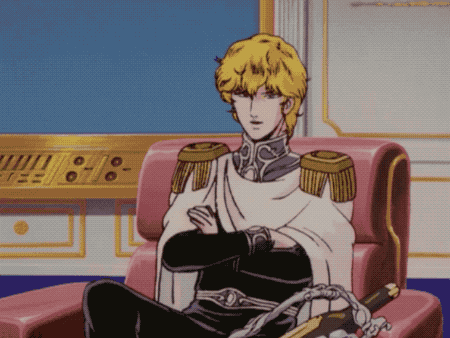
In this moment from episode 8, Reinhard is essentially betting Kircheis that Oberstein won’t do the exact sort of thing that he ends up doing in episode 23. The bet is, of course, one-sided—Kircheis has no interest in proving Reinhard wrong; he just wants Oberstein to stay the hell away.
In order for Reinhard to censure Oberstein, he would first have to admit that Oberstein deceived him in such a way as to cause the deaths of 2 million people. And the enormity of Oberstein’s crime would reflect the enormity of Reinhard’s failure not only to control Oberstein in this one instance, but also to have the foresight to see what was coming—which Kircheis did, unlike him.
In short, Reinhard is too proud and too stubborn to admit that he’s in over his head, and was wrong about Oberstein. And without a willingness to ask for help shouldering the burden of Oberstein’s treachery, the fact that Reinhard has a team of handpicked and distinguished admirals at his disposal is irrelevant. He’s alone, and faced with the prospect of no support in a fight against Oberstein, he gives in.

An obvious drawback of Reinhard keeping his fears and concerns secret: Anyone who puts two and two together is going to assume the worst. Luckily, he has Kircheis to argue for giving him the benefit of the doubt—at least until he can confirm or deny the rumors for himself.
Stray Tidbits
Reuental and Mittermeyer holding their hands in identical positions as they walk past the disgraced nobility is such a good detail—the animators absolutely never miss a chance to show us how fucking in sync these two are. Damn.

And here is another nice bit of LoGH’s trademark consistent characterization, in which Artist-Admiral Mecklinger rallies the troops to... save the Empire’s art collection? Yes. A very soldierly activity. I love how enthusiastic and serious they all are.

Okay so it looks like Ansbach’s feelings in Braunschweig’s direction are less of a comparison with Kircheis’s and more of a foil for them. Ouch. Rest in pieces, Braunschweig.

In less unsavory news that somehow still relates to men swearing undying loyalty to one another, Merkatz and Schneider are going to the Alliance! And as another contrast with the fucked up retainer/vassal relationship between Braunschweig and Ansbach, Schneider proposes that he and Merkatz defect together only after keeping him from committing (honorable) suicide. What a precious young man! I wish these two nothing but the best. Bon voyage!

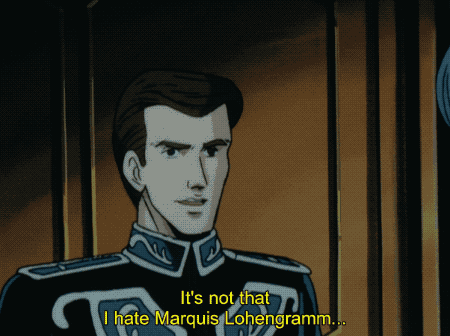
#Legend of Galactic Heroes#Legend of the Galactic Heroes#author: Elizabeth#Empire#Reinhard#Westerland#Oberstein#Kircheis#pride
21 notes
·
View notes
Text
Episode 16: A New Tide

Fall 796/487. The Battle of Amlitzer Starzone wraps up as a big win for the Empire and a big loss for the Alliance—though not for Yang’s fleet, which is able to escape mostly unscathed. Reinhard decides to punish Bittenfeld for fucking up royally, but Kircheis convinces him not to, much to the sinister Oberstein’s chagrin. Then, twist! The Kaiser dies of a heart attack! There’s no direct male heir, so a bunch of vaguely related randos jockey for position before it’s decided that the throne will be awarded to Frederich IV’s grandson, the five-year-old Erwin Josef II. Over in the Alliance, Yang is appointed Commander of Iserlohn, where he immediately hires all his misfit friends and co-conspirators to help make Iserlohn the best party fortress in the galaxy. Meanwhile, Reinhard and Kircheis touch each other a lot (in the past and in the present), and Reuental and Mittermeyer, unable to go on a date during an actual battle, FaceTime instead. Annerose actually gets to be happy for once.
Reinhard and Kircheis
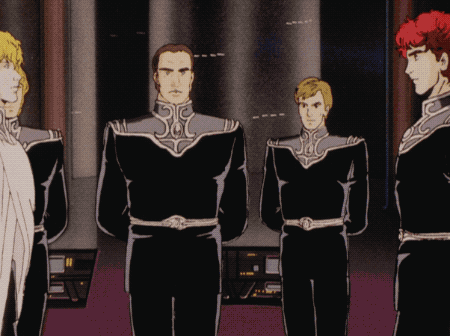
There is SO MUCH telling body language in this moment: their hands simultaneously reaching for each other, Reinhard’s lingering touch on Kircheis’s shoulder, Kircheis’s tiny head tilt down... It’s unfair that they can’t just kiss onscreen, isn’t it?
It’s been a couple episodes (and at least a few in-universe weeks) since our central couple have been in the same place at the same time, and you’ll recall they parted on complicated terms. But as has been the case in the past, Reinhard and Kircheis are nothing if not good at compartmentalizing. Kircheis may not approve of Reinhard’s Oberstein-inspired methods of late, but that doesn’t stop him from carrying out his orders to the letter and looking forward to a happy reunion. And Reinhard’s concerns about the tension between them at this point seem only to heighten his relief at Kircheis’s safe and successful return home.

Even during this period of uneasiness between the two of them, Kircheis’s mood at the prospect of seeing Reinhard again is unambiguously positive. And very sweet.
Of course, Reinhard’s public display of intimacy with Kircheis upon his return, however restrained, has the sinister Oberstein on edge, which only increases when Kircheis unabashedly follows Reinhard into his private quarters following his harsh reprimand of Bittenfeld.
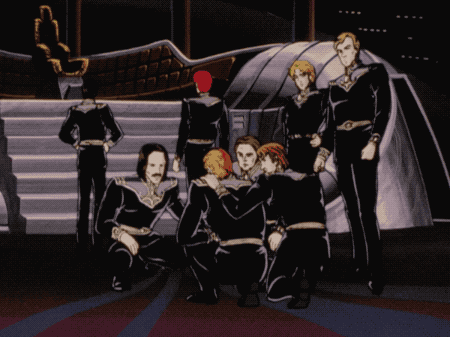
Mittermeyer clearly also notices Kircheis unsubtly walking after Reinhard, but he minds his own damn business. (That’s kind of Mittermeyer’s thing, as we’ll see much more of later on.)
But luckily for us, Kircheis cares about what Oberstein thinks exactly as much as is warranted (not at all), so he’s about to exercise some special privileges, and we get to watch.
Influential Kircheis
We’ve heard a lot about Kircheis’s ability to influence Reinhard—Annerose has encouraged it; Oberstein has been wary of it—but until now Kircheis has been almost entirely agreeable, even when he doesn’t agree. If he really does have significant sway over Reinhard, it seems like he’s been playing it pretty close to the vest. Actually, it turns out he’s just been saving up his Influence Reinhard Chips to spend on something worthwhile: what he sees as Reinhard’s callous treatment of a subordinate.
Whenever we get glimpses into the inner workings of Reinhard and Kircheis’s relationship, it’s worth an in-depth examination, and the episode 16 Bittenfeld conversation is a doozy, so get comfortable.
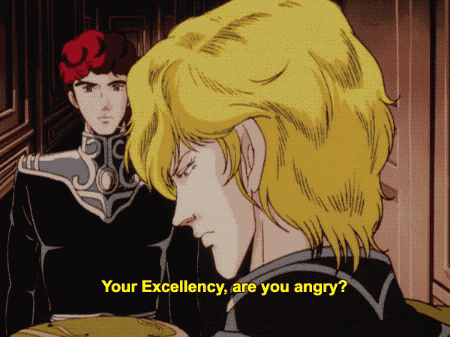
After his first request for Reinhard to reconsider his punishment of Bittenfeld is met with indignation, Kircheis abandons that line of inquiry and moves onto something less direct but more uniquely accessible to him: Reinhard’s emotions.
Yes, it’s a conversation about feelings! There are a few things about this whole scene that make it something only Kircheis can do—the setting, the straightforwardness, his eventual successful persuasion of Reinhard to his way of thinking—but the most pronounced is definitely its subject matter. It’s safe to say that, with the probable exception of Annerose, Kircheis is the only person in the entire galaxy who could initiate a conversation about feelings with Reinhard von Lohengramm and live to tell the tale.
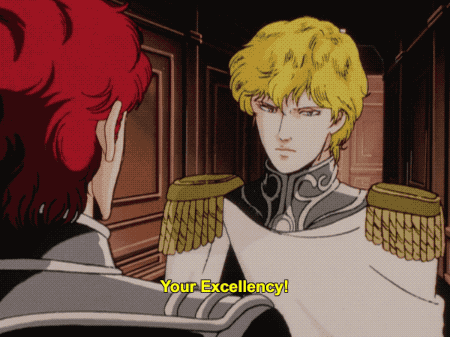
The trouble with dating in the workplace: Once Kircheis has made clear the level of intimacy necessary to having this conversation, Reinhard gets annoyed that he’s still using such an official form of address (kakka).
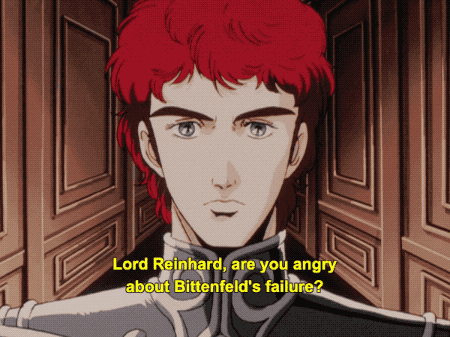
Of course Kircheis being Kircheis, the least formal address he can muster is Reinhard-sama, but here at Icebergs we don’t believe in kinkshaming. Let your freak flag fly, Kircheis!
Kircheis proceeds to perform some highly accurate armchair psychology on Reinhard, and posits that the true object of Reinhard’s anger is not Bittenfeld but (gasp!) Reinhard himself. This, of course, pisses Reinhard off but only because of how true it is, proving yet again that he is among the most relatable characters in LoGH.


Reinhard’s adorably self-contained mini-tantrum, above, fazes Kircheis literally not at all, which I find to be super touching—Kircheis says something that he knows will get under Reinhard’s skin, and then makes it clear that it’s safe for Reinhard to process that emotion openly in his presence. He’ll wait. Also worth noting is that, while Reinhard expresses anger and frustration in public quite frequently (as we’ll see far more of in the future), usually whoever is unlucky enough to be standing near him at the time becomes anything between wary and downright terrified, as can be seen in these moments from episode 15:


It’s to be expected that the random low-level officer above on the left would flinch spectacularly at Reinhard’s, um, amazing line there, but even the pathologically stoic Oberstein is not immune to standing slack-jawed in the presence of Reinhard’s fury. Kircheis, who has been Reinhard’s constant companion for a decade, knows what to expect from Reinhard and is not even a little bit afraid of him. I imagine Reinhard must find that very comforting.
When Kircheis gets to the point of why he followed Reinhard in the first place, he does finally lose his composure a bit—and for Kircheis, as I’ve discussed, a bit of lost composure goes a long way.
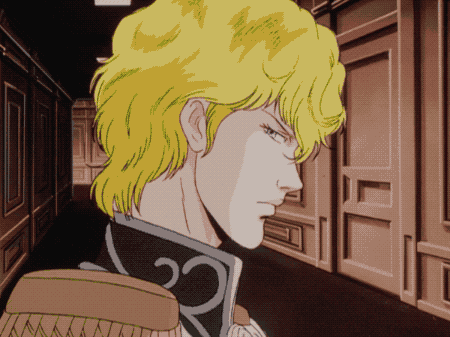
Kircheis’s general affect is one of carefully controlled size and strength. This is only the second time we’ve seen him lose his cool, and just like when he did in episode 9 (below), his impassioned movement fills the screen far more than his usual calmness does.

Emotionally unrestrained Kircheis can barely be contained by your TV screen.
Whether it’s his unleashed passion or his reasoning that does it, Kircheis is able to convince Reinhard, and after letting the anger flow through him for a bit, Reinhard calms down enough to admit that Kircheis is right, and he shouldn’t punish Bittenfeld. Reinhard starts to walk away, then turns back to ask Kircheis something, and we are blessed with what is definitely one of the top ten softest moments in all of LoGH:

Soft-eyes Reinhard is a gift among gifts, we are not worthy. This exchange is just so sweet and pure, I love these two boys.
Supportive Kircheis
Episode 16 is All About Kircheis... with respect to his relationship with Reinhard, of course. We’ve already seen how Kircheis is able to exercise his much-talked-about Influence Over Reinhard, and now it’s time to delve deeper into another aspect of their dynamic: Kircheis as emotional protector.
Given the toll Kaiser Friedrich IV has taken on Reinhard’s life, you might expect for him to be happy when the Kaiser suddenly drops dead of a heart attack, but this is Reinhard, so you’d be wrong. Instead, Reinhard is profoundly frustrated that he doesn’t get to deliver some kind of appropriately cruel killing blow himself against the man who bought Annerose ten years ago. Kircheis, too, is frustrated, but for a different reason.
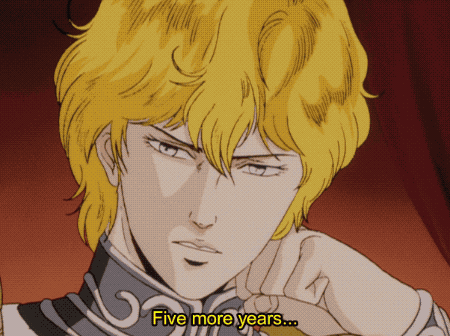
Kircheis’s nod here is ambiguous: At first glance he obviously agrees with Reinhard because of Annerose’s mistreatment at the hands of the late Kaiser. But his feelings are more complicated that that because, as always, he filters them through his feelings for Reinhard.
In response to Reinhard’s angry musings, Kircheis has a brief but frankly kind of incredible memory in which he fails the Reinhard-Bechdel Test so dramatically that I again feel kind of awful for intruding on what are clearly very private thoughts. Kircheis’s memory fills in an apparent blank in the episode 4 flashback, and is below basically in its entirety:
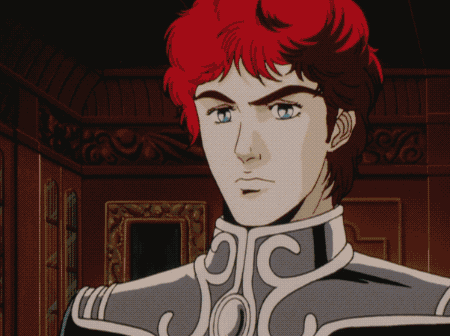

Contextually, it would make sense for Kircheis to be remembering the 15-year-old Annerose being taken away to become the Kaiser’s concubine—it’s what Reinhard was just talking about, after all. But Annerose only gets just enough screen time to confirm that yes, she’s the one in the car that Reinhard and Kircheis are chasing after.
Instead, both the camera and Kircheis are focused on how devastated Reinhard is. Kircheis doesn’t flash back to losing Annerose—he remembers supporting Reinhard (physically, even!) through the trauma of him losing Annerose. Of course Kircheis is angry at the Kaiser for what he did to Annerose: Annerose was basically family for the short time that they were neighbors, and besides, it was a really objectively fucked up thing that happened to her. But the emotion that shows on his face when Reinhard bemoans his missed chance to personally murder the Kaiser is not about Annerose; it is, as always, about Reinhard.

And when Kircheis accompanies Reinhard to his long-awaited reunion with Annerose, the camera again tells us what we already know: Kircheis’s emotions, conveyed via a close-up of his tear-filled eyes, are in response to Reinhard finally getting his sister back.
Iserlohn, assemble!
Meanwhile, elsewhere in the galaxy, people are actually having fun instead of being sad, angry, and vengeful. We’ll learn a LOT more about the ins and outs of life on Alliance-occupied Iserlohn, but suffice it to say that I (Elizabeth) want to live there, and specifically if anyone can figure out some way for me to go drinking at a gay bar with Dusty, I would ask that you please let me know.
Anyway, newly-minted Admiral Yang is now officially in charge of Iserlohn, so it falls to him to appoint all the usual suspects to important positions under his command—Dusty, Schenkopp, Frederica, and of course Poplan and Konev all get special mention.

Work it, Poplan!
Earlier in the episode, we see Yang and the, uh, gang seeing Cazellnu off at the airport—despite it not actually being his fault, he’s been banished to a remote frontier planet as punishment for the Alliance falling victim to Reinhard’s aggressive starvation tactic back in episodes 13 and 14—and Yang takes the opportunity to casually ask his friends to work for him in an official capacity when they get to Iserlohn.

We also see some great (as usual) Alliance streetwear, as well as Cazellnu’s wife, Hortence, who has finally blessed us with her presence. Rebecca is sure to talk more about her in the future. Possibly more than is strictly necessary.
There’s a nice little bit of exposition in the background of this scene that’s conveyed, like so much else in LoGH, through facial expressions: Listening to Yang start to fill out the roster of people he’s taking to Iserlohn, Julian’s face betrays his fear that he might not be among them.

This isn’t the last time Julian telegraphs his emotions to the viewer without saying anything, so make sure to keep a close eye on his expressions, especially when the camera makes a big point of it like it does here.
This potential drama is resolved off-screen, but seeing the worry on Julian’s face at the airport makes the reveal that he did get to come along after all a really sweet moment.

Julian and Gensui are ready to be photographed for the Winter 796 Sears Christmas Catalog cover.
Stray Tidbits
What the hell kind of anime bullshit is going on in Phezzan?? I neither know nor care.

These buildings look like they were designed by Dr. Seuss.

Two things: First of all, I love that Reuental and Mittermeyer check in with each other after a battle. We don't see anyone else do this for non-essential reasons, and it's adorable. Second of all, the loop on this gif cracks me up. Mittermeyer is 5+ inches shorter than Reuental; you can't just copy and paste their chairs!

So did Mittermeyer get a tiny chair in order to make him look Reuental's height, or did Reuental get a huge chair to make himself look small? Future historians can only guess.
#Legend of Galactic Heroes#Legend of the Galactic Heroes#author: Elizabeth#Empire#Alliance#Reinhard#Kircheis#holding hands#Iserlohn#Julian
32 notes
·
View notes
Text
Episode 18: The Lippstadt Conspiracy

April 797/488. Now that Reinhard’s pick for Kaiser has taken the throne, the oppositional Braunschweig and Littenheim assemble a motley crew of disgruntled nobles to overthrow him and take down Reinhard in the process. Obviously, this goes poorly for them. Before that happens, Hilda takes the initiative to arrange an alliance with Reinhard, firmly positioning herself as the only remotely intelligent noble not already in his admiralty. Braunschweig appoints veteran admiral Merkatz to lead his anti-Reinhard charge; Ferner (unsuccessfully) takes matters into his own hands; and Reinhard, having gotten the jump on Braunschweig, struts around extremely pleased with himself. Annerose, meanwhile, gazes sadly at nothing in particular, and I think Reuental and Mittermeyer are too busy arresting treasonous nobles to go on a date. Oh well.
A few episodes ago, Rebecca introduced some of the less prominent—though still important—characters in the Alliance. Well, the time has come to do the same for the Empire! Episode 18 has some politically important plot stuff, and finally (finally!) properly introduces Hilda, but in terms of hidden meaning below the surface, there’s not much to speak of. So without further ado, I present to you a Who’s Who of some of the Empire’s many side characters (and Hilda)!
Hildegard von Mariendorf

I’ve mentioned Hilda a couple times before, but there wasn’t really any reason to until now, beyond the fact that she’s my favorite character and I love her. Now, we get to spend some much-anticipated quality time with the galaxy’s best and brightest lesbian. I’ll get more into the queerness of Hilda later on, when it’s discussed more directly; for now, let’s take our cue from the show and focus on what she does rather than who she is.

Hilda is the smartest person in every room, especially when that room is a bar full of Imperial aristocrats.
When we first meet Hilda in episode 18, she’s eavesdropping on a bunch of nobles gossiping in a bar about who they plan to support in the upcoming battle for supremacy between Reinhard and Braunschweig et al. Hilda, of course, has already made up her mind, which we see in a flashback to a very recent conversation she had with her father on the subject.

Unlike all the other dads in LoGH, Hilda’s dad, Franz von Mariendorf, is not a piece of shit. He takes his daughter seriously, respects her political opinions, and has no qualms about ceding his family power to her.

The uniquely positive nature of Hilda’s relationship with her dad, like other contrasts and comparisons in the LoGH universe, draws attention to the intentionality of the creative team’s choice to show us so many bad fathers. I’ll be talking about this a LOT more later, so keep it in the back of your mind.
Hilda has (correctly) realized that betting on Reinhard is so safe it can hardly be called a bet, and with her father’s blessing, she arranges to meet with Reinhard himself to discuss terms of a mutually beneficial alliance. Her frankness and obvious political acumen impress Reinhard, who takes an immediate liking to her, accepts her proposal (even agreeing to give it to her in writing, when she pushes him on it), and then leaves to go start the civil war that she predicted.

Did you somehow miss that Hilda is super driven and intense? Her expression here should clear up any remaining doubts.
The most striking aspect of this scene, though, isn’t the political maneuvering—it’s the introduction of the dynamic between Reinhard and Hilda, one of the most interesting relationships in the whole show. Almost right away, Reinhard is caught off guard not by Hilda’s boldness, but by how much he obviously likes her. His invitation for her to dine with him sometime in the future is the first time we’ve ever seen Reinhard take the social initiative with anyone other than Kircheis.
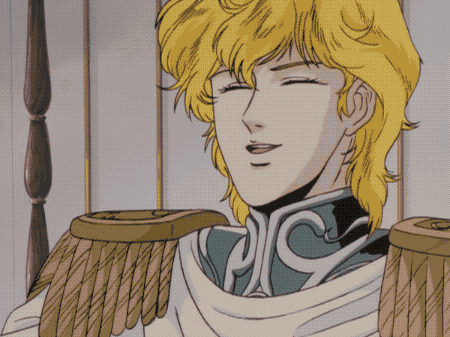
Fun fact, though: The first word that Reinhard ever says to Hilda is actually none other than, you guessed it, “Kircheis.”
As we’ve discussed at length before, relying on heteronormative shortcuts will get you nowhere in LoGH: The mood of this scene, despite containing within it a man and a woman, is as businesslike as Hilda’s uncompromising tone throughout; Reinhard’s interest is, of course, platonic. I love them.
Ernest Mecklinger
As I’ve said, Reinhard/Kircheis and Reuental/Mittermeyer are the two Great Romances of LoGH, so among Reinhard and his admiralty and for the purposes of a queer reading of this show, I’ve been focusing primarily on those four. But the rest of Reinhard’s admiralty is worth talking about too! I’m not going to go through all of them yet, because honestly very few of them make an impression at this point, but I’d like to spotlight a couple (no, not an actual couple, for once) of the more prominent less-prominent admirals who have been adding background color and texture for a while now.
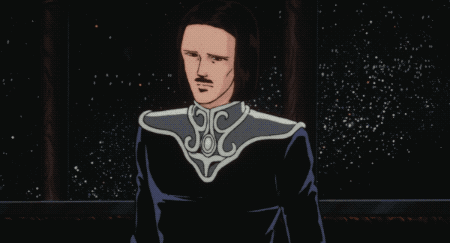
(From “My Conquest.”)
First up, Ernest Mecklinger! Canonically, I think he’s the only one of Reinhard’s admirals who has hobbies beyond “war” and “drinking.” They include: painting, general consumption of the arts, and presumably waxing his mustache. Mecklinger can usually be counted on to be level-headed and generous; he chooses his words carefully, and later on we’ll see scenes in which the only way to describe how he acts is Like A Sweetheart. In the novels, we are told that Mecklinger is nicknamed the “Artist-Admiral” because of how cultured and well-rounded he is.
Fritz Josef Bittenfeld
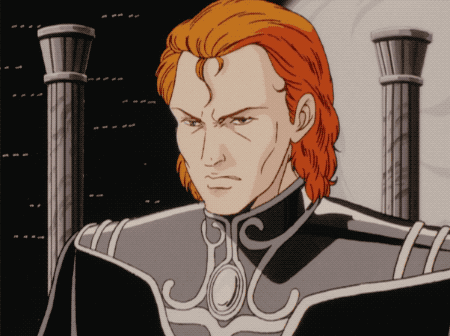
(From episode 16.)
On the complete opposite end of the spectrum is Bittenfeld, the short-tempered, bombastic commander of the Black Lancers (basically picture the intensity and camaraderie of the Rosen Ritter, except a fleet instead of an infantry unit, and without the long history of defection and betrayal). Bittenfeld has already been the recipient of one slap on the wrist—that would have been a lot more severe if not for Kircheis’s intervention—and frequently gets into trouble for rushing into dangerous situations before he’s fully thought them through, both on and off the battlefield.

Look, I did my best to sum up the differences between Bittenfeld and Mecklinger but I honestly don’t know why I bothered when this one exchange captures them so perfectly.
Anton Ferner

Here to answer the eternal question of “What if Oberstein, but hot?” is Anton Ferner, an Imperial cop who is loyal to whomever he dubs most able to make use of his loyalty. Like Oberstein, Ferner views himself less as someone with ambitions of his own and more as a tool to be wielded by someone more powerful. Also like Oberstein, Ferner has an unsettling air about him, made only slightly less so by the fact that he doesn’t habitually remove his eyeballs (that we know of).

You may remember Ferner from back in episode 9, when he sardonically refused to fire on the suicidally destructive Klopstock because a statue of Rudolph von Goldenbaum stood in his way.
However, whereas Oberstein has an overarching philanthropic goal that drives his utilitarian machinations, Ferner’s only motivation seems to be the joy he derives from serving someone he has deemed worthy. And here we get to the main difference between Ferner and Oberstein (other than their respective levels of hotness): Ferner can, in fact, feel joy! Or amusement, anyway.
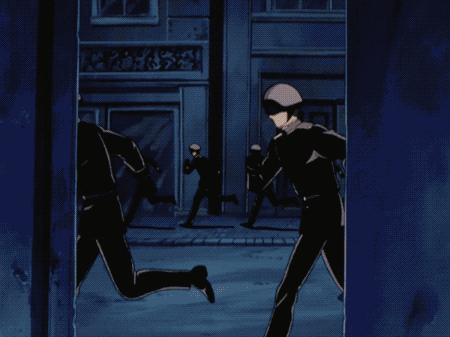
Ferner is constantly smirking when he’s been bested in some way; he absolutely gets off on other people being powerful and talented, but again, we’re not here to kinkshame.
After Ferner ignores Braunschweig’s orders, attempts to assassinate Reinhard on his own, and is summarily defeated, he surrenders to Reinhard and offers him his loyalty. Reinhard, never one to scoff at potential no matter how it ends up in front of him, accepts and, appropriately, gives him to Oberstein as a pet.

I’ll bet you thought I was kidding.
Oberstein and Ferner, the creepiest utilitarian weirdos in the galaxy, have found each other at last! I’m sure they’ll get along great; Ferner, at least, will probably think Oberstein’s removable-eyeball trick is hilarious.

And we must never ever forget that Ferner, according to Matsuri Okuda’s original character designs, started life as a rejected Reuental concept. Which may explain why I think he’s so beautiful.
Otto von Braunschweig (and Ansbach)
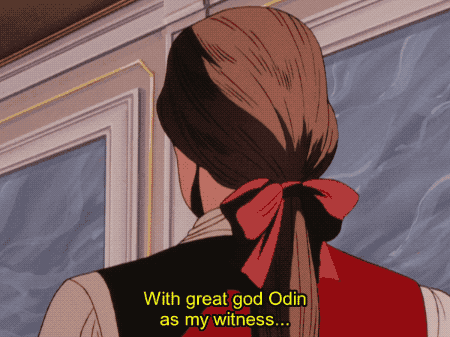
Have you noticed that nobody on Reinhard’s team—not even anyone of noble birth—has that awful George-Washington-style aristocrat hair? Even Mecklinger, who keeps his hair long, doesn’t wear it in a ponytail with an enormous bow. My point is that Braunschweig’s hairstyle, which is hideous, is also a good indicator that he is evil, or at least regressive. And whereas there’s an abundance of nuance when it comes to whether the Empire or the Alliance is morally “better,” everyone can agree on one thing: The Imperial nobles are bad. And Braunschweig, as their leader, is the most bad.

Another way to tell Braunschweig is evil is that he frequently does things like imply that if celebrated admirals don’t do his bidding, he’ll have their young daughters killed.
Braunschweig—who is the late Kaiser Friedrich IV’s son-in-law, by the way—is actually too unambiguously evil to be interesting on his own. The only thing that holds my attention about him beyond the fact that I want to cut off his ponytail is the fact that he is one half of yet another pair of men. And his loyal retainer and counterpart, Ansbach, is in turn only interesting insofar as parallels are set up between his relationship to Braunschweig and Kircheis’s relationship to Reinhard, particularly (so far at least) in episode 9:
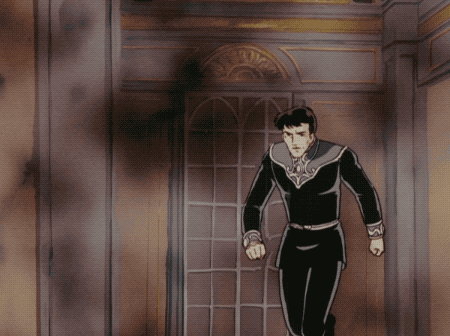
Remember this? The similarities between Ansbach and Kircheis’s frenzied searches for Braunschweig and Reinhard, respectively, are too striking to be anything but intentional.
Like I said in my episode 9 post, though, there’s no reason as of yet to think that the relationship between Braunschweig and Ansbach is romantic; even if that’s what the parallels point to, they’re one-sided at this stage, so if Ansbach’s feelings of devotion do cross over into romantic territory, it’s unlikely that they’re reciprocated. Sorry, Ansbach.

Incidentally, Ansbach doesn’t have a last name. Or he doesn’t have a first name. In any case, he only has one name, and it’s Ansbach. Also, if I didn’t hate him so much, I’d be worried about his skin. He looks like he could use several glasses of water, maybe applied directly to his face.
Willibald Joachim von Merkatz (and Schneider)

Merkatz was actually voted the class of 447’s Most Expressive Eyebrows at military academy. Wow!
Merkatz, a very accomplished and grizzled admiral who has been griping about Reinhard and his youth since episode 1, will spend more time in the spotlight later, but I wanted to mention him now for a couple reasons: First of all, his eyebrows are incredible and I can’t stop watching him move them. I honestly don’t know what he’s saying most of the time because I’m too focused on his eyebrows. I’m simultaneously impressed and scared. Second of all, we can go ahead and add Merkatz to the growing stack of (male) characters who are one half of a defined (male) pair.
Merkatz’s counterpart, Bernhard von Schneider, is a young officer who spends most of his screentime in episode 18 with his jaw on the floor while Merkatz explains to him the concept of nuance.
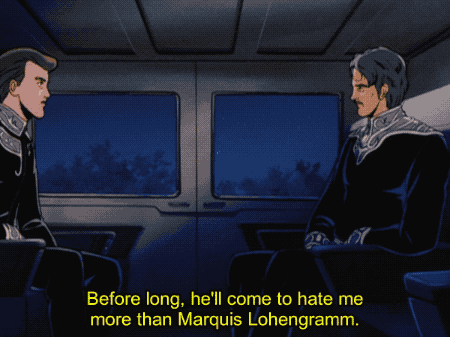
Or maybe he’s just mesmerized by Merkatz’s eyebrows. Same, Schneider. Same.
Anyway, keep an eye on these two, and by these two, I mean Merkatz’s eyebrows. I’d also recommend maybe paying attention to Merkatz himself, and Schneider too, because there will be a lot more to say about them down the line.
Stray Tidbits
I really enjoy how ostentatious literally everything to come into contact with the Imperial nobility is; like how are Reinhard and Kircheis's ships less flashy than something? How?


I am being personally victimized by the fact that this guy’s monocle doesn’t actually fall out.

#Legend of Galactic Heroes#Legend of the Galactic Heroes#author: Elizabeth#Empire#Hilda#Franz von Mariendorf#Mecklinger#Bittenfeld#Ferner#Oberstein#Braunschweig#Ansbach#Merkatz#Bernhard von Schneider#bad dads#good dad!#Merkatz's eyebrows
18 notes
·
View notes